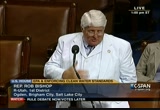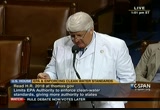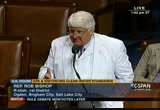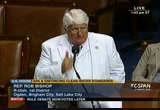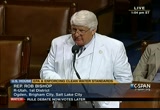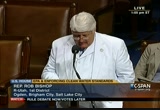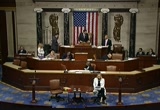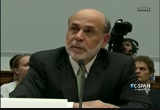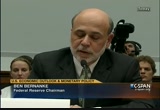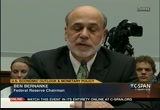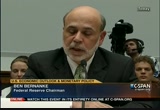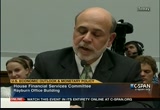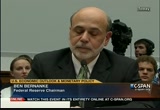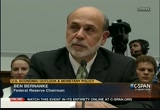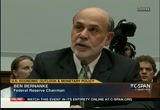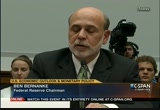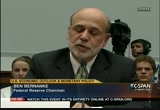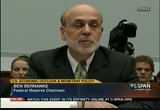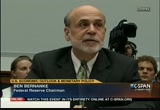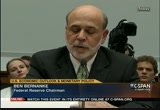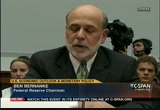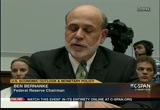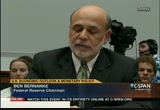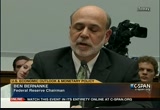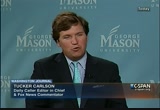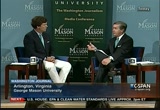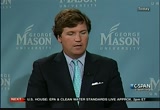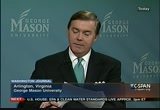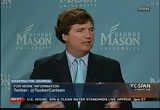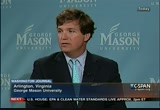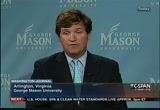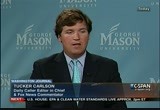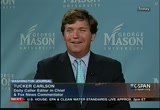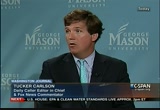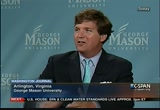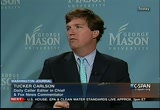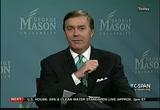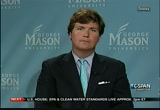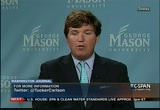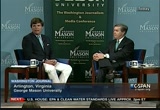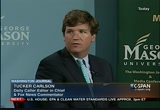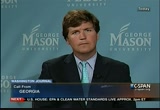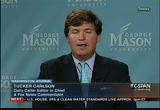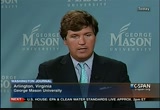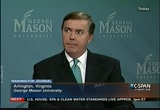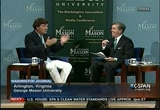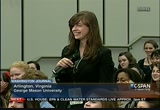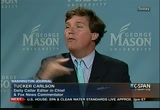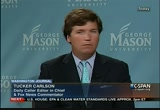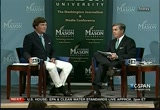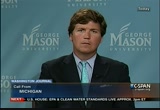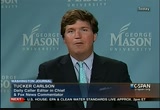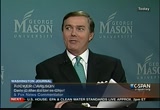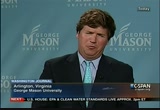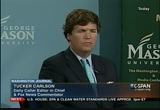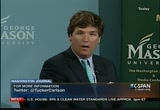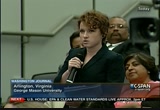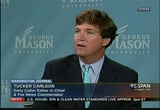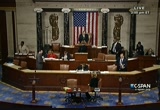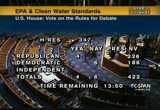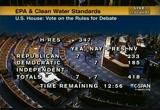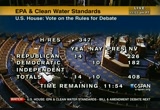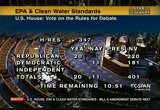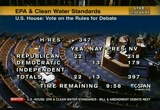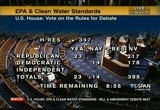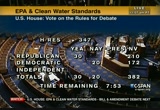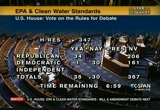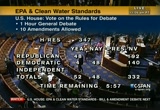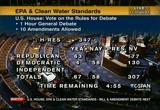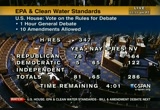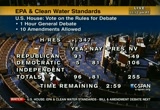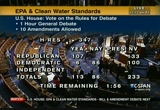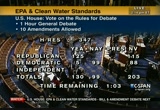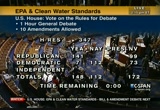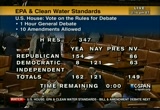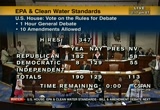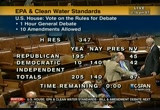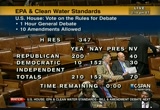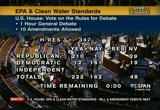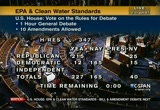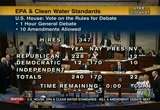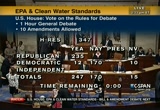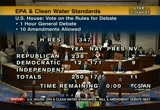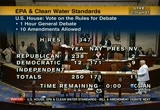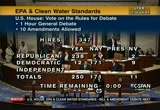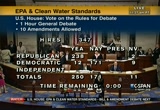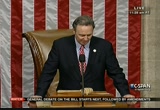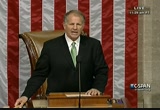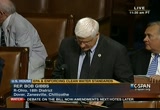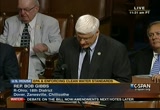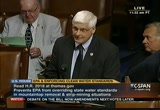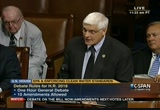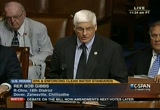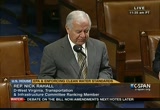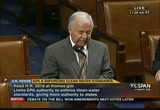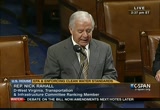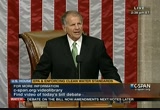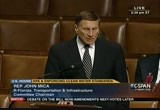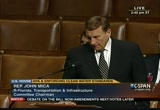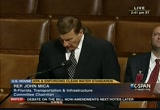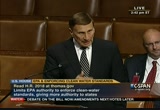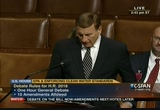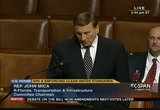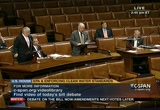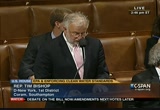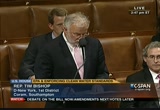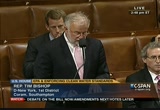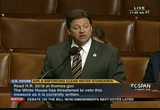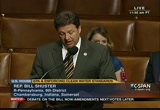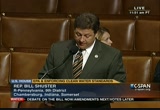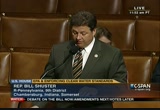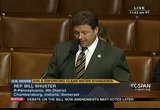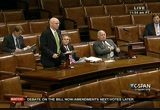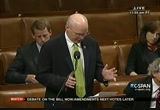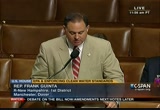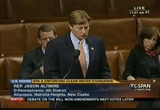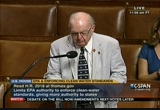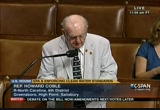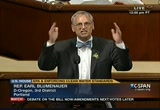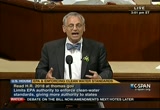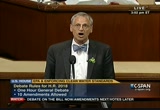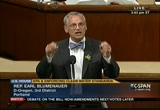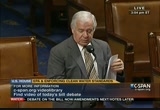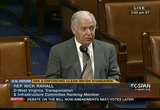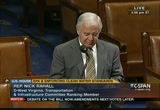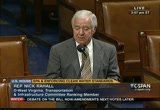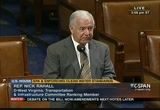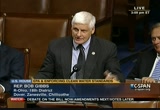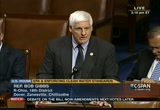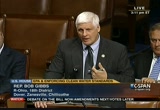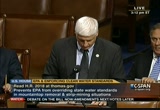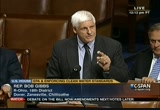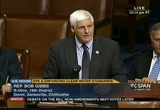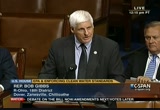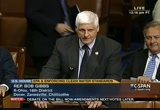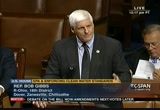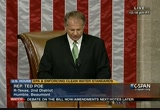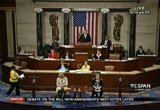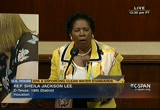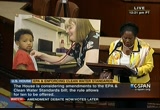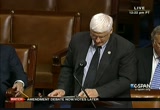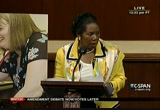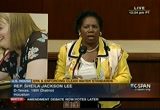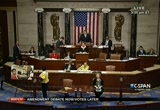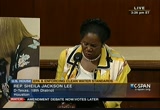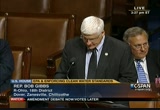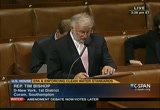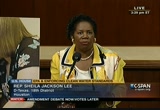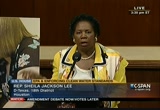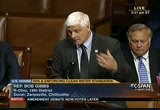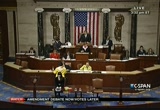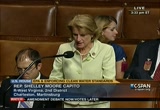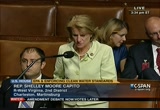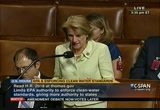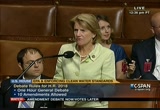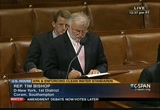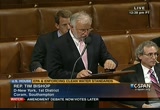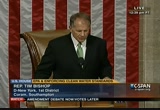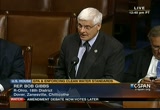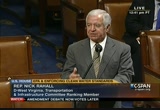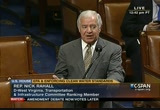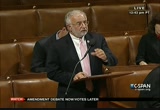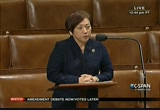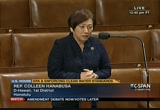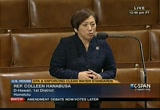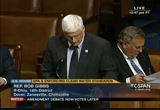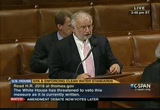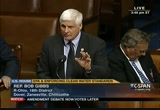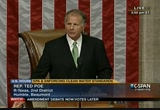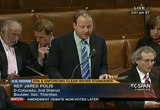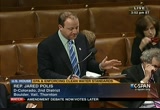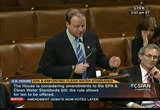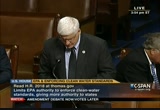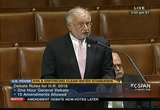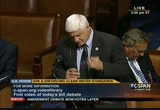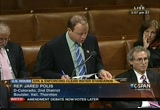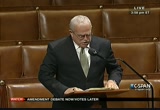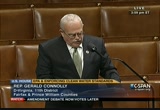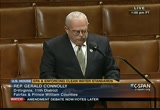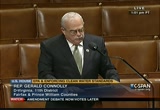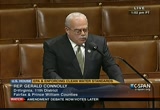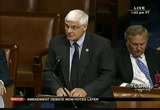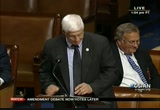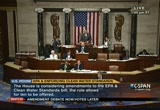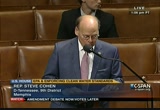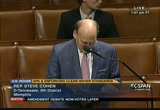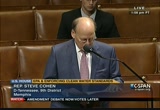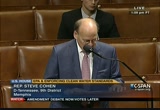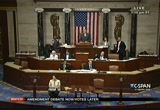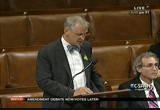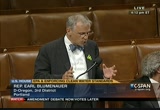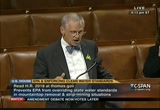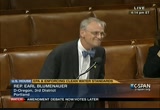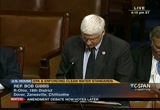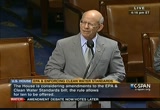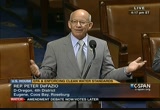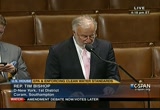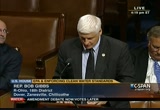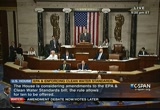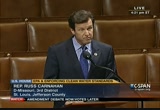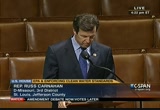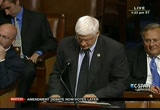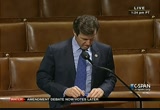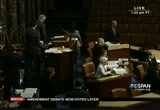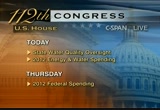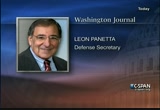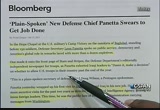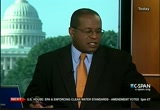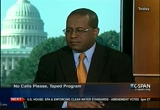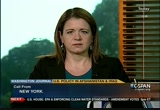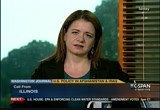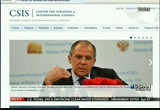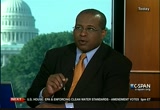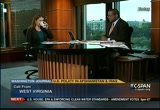tv U.S. House of Representatives CSPAN July 13, 2011 1:00pm-5:00pm EDT
1:00 pm
i encourage my colleagues to oppose the rule and the bill. i yield back the balance of my time. the speaker pro tempore: the gentleman from colorado yields back. the gentleman from utah. mr. bishop: thank you, mr. speaker. i also appreciate my good friend from colorado and the way he has conducted the debate so far in this rule. i have to admit, in closing on this particular bill that i, as someone who as a state legislator, worked on the complex that dealt with the largest undeveloped river in my district that went through and crossed six different state boundaries before it found its way to the great salt lake city, the idea that only the federal government can actually solve issues that happen between states or cross states boundaries is somewhat almost insulting to the idea of the states. it is maybe true that in every issue there is always some catalyst that brings it about. . the issue in florida and west virginia was a catalyst but it
1:01 pm
is not the only situation that has provided the basis for this particular bill. we have a letter from the louisiana department of agriculture and forestry who has written in support of this bill simply because louisiana is currently facing a similar threat from the e.p.a. chamber of commerce strongly opposes several amendments to this piece of legislation but they also wrote that the clean water act grants states the primary responsibility for protecting water quality, however recent action by the e.p.a. upset and you is plant this partnership with -- is up plant this partnership with arbitrary power that is being exercised even over states with regulatory programs. individuals and firms that meet the requirements of and obtain permits from state regulators ought not to be left exposed to the enforcement whims and can prison of the federal government. which is the reality. finally the national association of state departments of agriculture also talk about this bipartisan piece of legislation that addresses the environmental protection agency's ongoing
1:02 pm
regulatory overreach and it allows the basis, if we pass this bill, for states and the federal government once again to be able to work together. i have stated repeatedly that one of the problems we do have with the provisions of the clean water act is the concept of accountability. where is someone allowed to kind of comprehend and guess what the federal government does when it overreachs? let me give you one specific example since the gentleman from tennessee did and it states the same concept that happens to be there. we'll call this guy jean that's because that's his first name. he was a farmer on a family farm , a sugar beat farmer, which i would remind you is a root crop. you try to have a sugar beat crop in wetlands and you come up with rotted vegetables. but one federal bureaucrat from these agencies driving by his property within day, seeing it flooded, decleared it to be a wetland, even though the farmer said the only reason the water is there is because we have a pipe from the crick that goes over to the land and when the
1:03 pm
farmer removed the pipe from the crick to show that the water was not natural flowing into that area he was threatened with jail term if he actually moved that pipe one more time. now even though they took core samples from the water conservancy district to proof there was too much clay to have water bubble up from underground, this one bureaucrat from these agencies still maintains this was a wetland. when asked how long would it take to determine even though the science is against him that he is wrong, his response was six to seven years because i want to go through a wet and dry cycle to see if maybe per chance water may not come up again on this person. now, the issue in why i am so passionate about this is because for jean this farm was his heritage. more importantly it was his retirement. and it was his legacy for his kids. and what one bureaucrat using the broad powers given under the
1:04 pm
clean water act was able to do is basically impose a taking on this person's property without ever compensating him for, it because they didn't take the land away, they just told him what he could do with it and more importantly because of that regulation now on his property for what he could sell he was able to finally unload his property at a quarter of the value that a neighbor from which this one bureaucrat did not see was able to sell his exact same lot on the exact same road with the exact same type of land. that is the unfairness that has developed with a bill that is so loosely written, two supreme court decisions have criticized the bill and implored congress to go back there and do our jobs and to tighten it up so that you don't have conflicting strategies and conflicting pat herbs and conflicting rules and regulations in different parts of the country. that's what we're attempting to do here. there is a pattern of abuse. it hurts people.
1:05 pm
it is time to respect the idea that states care as much about their own states as the federal government would care about their state and you can make the presumption they probably care more. that's why this is a good bill. and that's why this is an issue of federalism. this is going back to what the original clean water act was supposed to do, tone courage and indeed control and ensure -- to encourage and indeed control and ensure that there would be bipartisan cooperation between the states and the federal government and unfortunately as the years have progressed, the role of the states have been diminished by capricious acts on the parts of the federal government. that can no longer be. that is the status quo that is unacceptable, that needs to be changed, that is exactly what this bill is attempting to do. mr. speaker, in closing i would like to reiterate the fairness of this structured rule and urge its adoption as well as urging the adoption of the underlying legislation. mr. speaker, i yield back the balance of my time and move the previous question on the resolution.
1:06 pm
the speaker pro tempore: the gentleman yields back the balance of his time. without objection, the previous question is ordered. the question is on adoption of the resolution. those in favor say aye. those opposed, no. the ayes have it. mr. polis: mr. speaker. on that i ask for the yeas and nays. the speaker pro tempore: the yeas and nays are requested. all those in favor of taking this vote by the yeas and nays will rise and remain standing until counted. a sufficient number having arisen, the yeas and nays are ordered. pursuant to clause 8 of rule 20, further proceedings on this question will be postponed. pursuant to clause 12-a of rule 1, the house will now stand in recess subject to the call of
1:09 pm
in light of these developments, the president of the federal reserve board and the federal reserve bank, in late june reflected their assessments the pace of economic recovery will pick up in coming quarters. specifically participants project the increase in g.d.p. of 2.7% to 2.9% for 2011, inclusive of the weak first half and 3.3% to 3.7% in 2011. projections if realized would constitute a notably better performance than we've seen so far this year.
1:10 pm
f-1-c participants see the economic strengthening with g.d.p. picking up to 4.2% in 2013. the central tendencies of the real g.d.p. growth in 2011 and 2012 were marked down one half percentage point than those in april saying participants saw at least some point of the first half slowdown as persisting for quite a while. among the head winds is consumer spending, even after the effects of higher food and energy price, the continued depressed condition of the housing sector, still limited access to credit for some households and small businesses and fiscal tightening at all levels of government. consistent with projected growth and real output, modestly above the trend rate, f-1-c participants said the job rate will decline slowly,
1:11 pm
albeit, slowly. the forecast for the unemployment rate werele.6% to 8.9% of the first quarter this year. 7.98% at the end of 2011. and 7.01% in 2013. the continuing weakens in the labor market, the unemployment rate decreased to 9.2% in june and gains in nonpayroll employment were below expectations for a second month. to date, more than 8.5 million jobs lost in the recession, one in three quarter million have been regained. of those planned parenthood, about 6%, 8.6 million workers, report they'd like to be working full time but can only obtain part-time work. nearly half of those have been out of work for more than six months, by far the highest ratio in the post-world war ii employment. it has significant hardships on
1:12 pm
their families and indeed the erosion of skills, it hurts their lifetime employment prospects and does not help our economy as a whole. much of the slowdown in aggregate demand this year has been separate in the household and consumers to spend will be an important determinant for other quarters. households report they have little confidence in their ability to recover about their own income prospects. moreover, the ongoing weakness in home values is holding down household wealth and weighing on consumer sentiment. on the positive side, household debt burdens are declining, deling wednesdayy rate on credit cars and car loans is down. and those missing a mortgage payment is decreasing. the pickup in economic activity
1:13 pm
and job creation, together with the expected easing of price pressures should bolster household income and confidence in the medium run. residential construction activity remains at an extremely low level. the demand for homes has been depressed by many of the same factors that held down consumer spending more, including the slowness of the recovery and jobs and income as well as more consumer sentiment. mortgage interest rates are near record lows but access to mortgage credit continues to be constrained. also, many of potential homebuyers remained concern about falling into a falling market as weak demand for homes, the substantial backlog of vacant properties for sale and the hyperportion of depressed sales is keeping a downward pressure on house prices. equipment and software, demand for u.s.-made capital goods from both domestic and foreign firms have supported thout the recovery thus -- throughout the
1:14 pm
recovery thus far. it has increase solidly so far and data on new orders by u.s. producers has continued in the first few months. access to capital markets have been able to refinance existing debt and locked in funding at lower yields. conditions for businesses generally have continued to ease, although as mentioned, the availability of credit appears to remain relatively limited for some small firms. inflation has picked up so far this year. the price index of personal conception he expenditures rose at an annual rate of more than 4% over the first five months of 2011 and 2.5% on a 12-month basis. much of the acceleration was the result of higher prices for oil and other commodities and to report good. in addition, prices for motor vehicles increased sharply when new models were curtailed by car shortages associated with the earthquake in japan. most of the recent rise in
1:15 pm
inflation appears likely to be transitory and f-1-c participants except to rates at or below 2% or a bit less and the participant's view is consistent with the maximum employment and price stability. the central tendency of participants' increase the rate of the p.c.p. price index was up in 2011 as a whole which has a slowing of inflation the second half of the year. in 2012 to 2013 the central tendency of the forecast was 1.5% to 2%. to moderate include the apparent stabilization in the prices of oil and other commodities which is already showing through to retal, gasoline and food prices. the still substantial slack of u.s. labor and product markets which has made it difficult for people to obtain wage gains and the stability of longer term inflation expectations is murder by -- is measured by
1:16 pm
surveys in households, financial market indicators. the f.o.c. members will likely remain moderate, that the unemployment rate will consequently decline gradually and inflation will subside are the basis for the committee's decision to maintain a highly accommodated monetary policy. as you know, the policy has two parts. first, the target range for the federal funds rate remains at 0% to 1/4 percent. conditions are likely to warn exceptionally low funds rate for a period. the second component for monetary policy is to increase the federal holdings for longer term securities. the approach is undertaken because the target cannot be lowered. the federal reserve's acquisition of longer term treasuries securities boosted the prices of such securities
1:17 pm
and have yields to be lowered than otherwise. in addition, by removing substantial quantity its and treasuries from the market, the fed's purchases induced private investors to acquire other assets that serve as substitutes for treasuries securities in the financial marketplace such as corporate bonds and mortgage-backed securities. by this means, the fed asset the asset program, like more convecksal monetary policy has served to reduce the yields and increase the prices of those other assets as well. the net result of these actions is lower borrowing costs and easier financial conditions throughout the economy. we know for many decades of experience with monetary policy that when the economy is operating below its poe tension, it will promote more economic growth. estimates based on a number of studies as well as federal reserve analyses suggests all else being equal, the second roupped will have longer term interest rates approximately 10 to 30 basis points.
1:18 pm
a reduction in longer term interest rates of this magnitude will be roughly equifflept in terms of the effect of the economy to a 100 to 140 basis point. in jupe we completed the planned purchase of 600 billion in longer term treasuries since initiated in november while continuing to reinvest the proceeds of longer term securities and treasuries. although we are no longer withstanding our securities holdings, accommodations by the securities purchase program is determined primarily by the quantity and mix of securities the federal reserve holds rather than the current pace of new purchases. thus, even with the end of net new purchases, maintaining our holds should continue to put pressure on market interest rates and foster more accommodated financial conditions that would otherwise be the case. it is worth emphasizing that our program involve purchases of securities, not government spending, as i will discuss
1:19 pm
later when the macroeconomic circumstances call for it we will unwind those purchases. in the meantime, interest on those securities is remitted to the u.s. treasury. when we began this program we certainly did not expect it to be a panacea for the country's economic problems. however, as the expansion weakened last summer, developments of both components of our dual mandate said that accommodation was needed. in that context we believed the program would help deplate inflation and provide a needed boost to faltering economic activity and job creation. the experience to date with the security purchases that just ended suggest that the program had the intended effects of reducing the risk of deproliferation and ensuring economic activity. in the months following the august anoupsment of our policy of reinvesting maturities and redeemed securities and our signal we were considering more purchases, inflation compensation has measured in the market for inflation index securities rose to more normal
1:20 pm
levels, suggesting that the perceived risk of inflation decreased significantly. this was a significant achievement, as we note from the japanese system, saying it can be costly in terms of weaker economic growth. with respect to employment, our expectations were modest. estimates made in the audit said we could boost over 700,000 jobs in two years or 30,000 jobs each month. may and june reflected the temporary factors discussed earlier, private payroll gains averaged 160,000 per month in the first half of 2011 compared with average increases of about 80,000 private months from august to may, 2010. the comparison is consistent with our expectations for employment gains. of course, we will be monitoring developments in the labor market closely.
1:21 pm
once the temporary shock had been holding down economic activity passed, we will see the effects of accommodation reflected in stronger economic activity and job creation. however, given the range of uncertainty about the strength of the recovery and prospects for inflation over the intern, the federal reserve remains prepared to respond if it indicates that monetary policy would be appropriate. on the one hand, the possibility remains that the recent economic weakness may prove more persistent than expected and that inflationary risks might re-emerge and have a need for additional policy support. even with the federal funds rate close to zero we have a number of ways in which we can ease financial conditions further. one option would be to provide more explicit guidance about the period over which the federal funds rate and the balance sheet would remain at the current levels. another approach would be to initiate more securities purchases or increase the average maturity of our holdings. the federal reserve could reduce the 25 basis point they
1:22 pm
have on their reserves, thereby putting pressure on short-term rates. of course, our experience with these policies remains relatively limited and employing them would have potential risks and costs. however, prudent planning requires us to us to look at others and to have another stimulus if conditions warrant it. on the other hand, the economy could evolve in a way that would warrant a more toward a less accommodated policy. accordingly, the committee has been given careful consideration to the elements of its exit strategy as report in the june meeting, it has reach a broad consensess about the sequence of steps that it expects to follow when a monetary policy is warranted. we'll beginning the process by ceasing the reinvestment of principal payments on securities, thereby allowing the federal reserve's balance sheet to begin shrinking. at the same time or sometime thereafter they'll monitor the forward guidance in its
1:23 pm
statement. subsequent steps would include the initiation of temporary reserve draining operations and when conditions warrant increases in the federal funds rate target. from that point on, changing the level or range from the federal funds rate target would be our primary means of adjusting the monetary policy in response to economic developments. sometime after the first increase in the federal funds rate target, the committee expects to initiate sales of agencies securities from its portfolio with the timing in pace of sales clearly communicated to the public in advance. once sales begin, the pace of sales is anticipated to be relatively gradual and steady but it could be adjusted up or down given the economic outlook or condition. over time the securities portfolio and quantity of bank reserves is expected to be at minimum levels. of course, conditions can change and in choosing the time to begin policy normalization as well as the pace of that
1:24 pm
process, should that be the next direction for policy, we will carefully consider both parts of our dual mandate. thank you, and i'm pleased to take questions. >> ben bernanke earlier today at the financial services committee. that is online. we will show it to you again in its entirety later in our schedule. also to note, he will deliver his semiannual statement on monetary policy on the senate side tomorrow to the banking committee, and we will have live coverage of that beginning thursday at 10:00 a.m. eastern. also today, the u.s. house, they are in a brief recess. they have been working on the rule for a bill that would limit the authority of the environmental protection agency to enforce water quality standards. we expect them at about 2:00 eastern. they will vote on the rule for that bill. amendments later on, general debate and more amendments as well on the water and energy bill. we will have the house for you when they gavel in on c-span.
1:25 pm
senators will continue debating the debt and deficit next week while house members take up another spending bill dealing with energy and water development programs. keep up to date with c-span's cronl chronicle, a comprehensive resource on congress with video of every house and senate session, vote records, too, the daily schedules, committee hearings and more information about your elected officials at c-span.org/congress. >> now is the time to deal with these issues. if not now, when? >> the debt limit is the legal limit on borrowing by the federal government, and since 1962 has been raised 74 times. the last time in february, 2010. learn more and follow the employee sess of raising the -- process of raising the debt cement at the c-span video library. search, clip and share. it's washington your way. >> we expect the u.s. house
1:26 pm
back in in about half-hour, 45 minutes or so. until then, part of this morning's "washington journal." . host: we are back live at the arlington campus. 150 students are gathered here representing 35 states and guam. high school seniors, part of the national journalism media conference. tucker carlson is with us. let's talk about the harsh headlines from your web site overnight. guest: as far as i understand it, it is a incredibly complex proposal that the senate minority leader has put forward -- majority leader has put forward. they have said that they will not stand for defaults. they have said that this is their breaking point. that is pretty close to giving up.
1:27 pm
host: you said that mitch mcconnell is not leading. guest: he is leading, but entering a negotiation by telling the person he is negotiating with the point at which he will concede. if we were in a store, you were the merchants, i say i will pay up to this amount, what would you charge me? that amount. you would know, of course, my pivot point. it seems to me that that is exactly what is happened. republicans, i think, both sides have said at the outset that we cannot the fall. what ever happens, we cannot the fault. -- at the outset that we cannot be faulted. what ever happens, we can not the fault -- what ever happens, we cannot default. host: president reagan raised taxes on 11 separate occasions.
1:28 pm
guest: correct. really, it is a question -- each case is different. case is different. it is a question of magnitude. not all taxes are the same. certain taxes clearly make it difficult for employers to hire people. they in fact -- they affect employment rates. they are pernicious. if they have very little effect on the economy. it really depends. i am not a believer on taking a fundamental position on taxes. however, taxes are pretty high, actually. there is a lot of evidence in the aggregate that when you the aggregate that when you force people to spend more of their income on taxes, that you depress the economy. host: in "the washington post" today made the lead the gop decision for governor harry running for president. is the fields that? is he going to run? guest: i do not know if he is going to jump in the race. my understanding as of last week
1:29 pm
when i spoke to someone involved in this effort, it is up in the air. it is a question of fund-raising and mother of the things. if you look at a fund-raising totals for the fund-raising candidates overall, 45 million total, that is an extraordinarily low number relative to the president's number announced today. a very high number. why are republicans not raising more money? if they are the party of rich people, if they are -- which they are not, by the way, but they still have this reputation. why are they not raising money? the answer seems to be pretty obvious. republican primary offers -- voters are dissatisfied. there is a lot of pressure to expand the field. i think you will see other candidates. host:, and your other writings,
1:30 pm
"in ventures in cable news." guest: i did not write the title. i had a much more obscure title that i thought was very clever that i have forgotten now. it was overruled by a publisher, who put that under the title on there. but it was a book about the cable news business. host: what did you learn firsthand? guest: i went from print, writing in magazines for 10 years. i went into television and posted a bunch of shows for 10 years. which makes me pretty old at this point. i learned that there is a very different relationship between television and print. they are very different. they each other on qualities. i would say television is more exciting. you can destroy your entire career in seconds in front of other people, which is kind of a thrill. knowing that she could really
1:31 pm
screwed up. print offers you very few opportunities to destroy yourself. but television offers less in death. in prince you may talk to someone for months, you know a lot about them and you do not get those opportunities in television. they are all interesting jobs. host of these students are interested in journalism. -- host: these students are interested in journalism. what would you tell them? guest: nothing they do not already know. the business is being transformed by technology. this is not a high point in journalism, as you may have read. american journalism is fairly boring, self righteous, an uptight. people do not read newspapers because they are not that interesting, actually. but that will change. it is clear that most print
1:32 pm
journalism is already on line and it will already be on line before too long. it would seem to have a lot of irresponsible news organizations printing untrue things. a lot of those establishments will go out of business. you will have a new establishment thriving mine. i guess that the bottom line is that there is clearly approved tourgh in the hit -- trough in the history of journalism. host: i have to rescue about rupert mart -- louvre murdoch and fox news -- and the news for organization. you weren't even on fox news this morning. will this have any impact on fox news in the u.s.? s tell fox news is a huge and vital part, -- guest: fox news is a huge and vital part of news corp. fox is very successful in my view. fox is fine as far as i know.
1:33 pm
fox has not been implicated, nor will it be, as far as i know. the scandal unfolding in great britain right now is interesting. it is upsetting to the extent that people had their personal voice mails listened to end in some cases the leaded. that is over the top. on the other hand, i have to say that a lot of the outrage seems politically motivated. virtually everyone in the press is liberal and they hate him because he is conservative. he is also resented for taking over a lot of companies. i would say that the violations of privacy that apparently took place, as a libertarian i am upset by that, pale in comparison to the ones that take place every day conducted by the u.s. government. who can look into your e-mail, telephone conversations, checking accounts, and no one says anything about it because
1:34 pm
it is done under the federal rubric of the war on terror. the rest of us sit by and allow it. we should not. if you are offended by what happens in great britain, you ought to be every bit or more offended by your government, which you are paying for, against your will in some cases, is doing the same thing. host: cnn, msnbc, saying that fox is ignoring this story. guest: [laughter] of course they are. they love it. "the new york times" is going wall-to-wall. this is like the new 9/114 "the new york times." i think it is a great newspaper. it is very left wing. but they are not good at hiding their agenda sometimes. they are just going hard on this story and gleefully so.
1:35 pm
they do not like rupert murdoch. they do not like his politics. they do not like the politics at fox. the editor said -- of course they are reveling in it. as is their right, by the way. i understand that. when your enemy is in trouble, pals. host: let's go for some questions. >> i was wondering if you believe that coverage by the media is more constructive or destructive when it comes to covering political decisions in campaigns. host: your opinion? >> i think that media influences the public's opinion and the public is not always properly informed and it may be destructive in a way. guest: it is a very complicated in a way, and it may be a long answer. i will say a couple of things. almost all of the information that we receive about the world
1:36 pm
is filtered through the press. there is a sensor there. the preconceived notions and flaws of people gathering the news. i would say the bad things are news. good things are not. we have all of these calls from outraged readers -- why is there all of this depressing stuff on page one? my editor told me once to tell them that when airplanes lane save what -- when airplanes laden -- when airplanes land safely, we do not print it. by the way, i am not defending the press. lots of reporters are dumb and lazy. in a few places, drunk. host: don, lazy, biased, drunk. guest: i would take drunk, and i am not endorsing of all, i would
1:37 pm
take drunk over lazy and dumb any day. i would say that if you want to be informed about what is happening in the world, a particularly in america, it is not so hard. c-span has that digital online archive that goes back to 1979? host: 1987. guest: you can watch anything that happened in the house or senate chambers right there on your screen. there are sources of information that were unimaginable 20 years ago when i was at your stage in life. uninformed? uninformed? it seems to me that if people do not know what is going on -- going on in american politics, it is 100% their fault. if you do not know what your voting for, please do not vote.
1:38 pm
there are all kinds of issues on which i do not vote. i covered politics for a living, but i do not vote on things i do not know about. there is this feeling that everyone has a civic duty to vote, that if you do not vote, you cannot complain. which is a lie, by the way. go ahead and complain. as a jury member in the capital jury case, i cannot leave in the middle of it and ask someone else could take my place. that would be irresponsible. it should be the same attitude you take with voting. if you do not want to pay for it, inform yourself and come back. if you do not want to do that, do not vote. host: thank you for the plug for c-span.org. ronald, next on the democratic
1:39 pm
line. caller: good morning. thank you for taking my call. i wanted to talk about the gop's stance on this debt ceiling. i think that the president should call their bluff. this is the obama reagan moment. when reagan said no to the kremlin, that is when he became a force to be reckoned with with the congress. this is obama's moment. he should tell republicans that if you want to not raise the debt ceilings, you want to thank wall street and take away the worth of the money, corporations, and banks, who had been worrying, making treasury bonds and worth of the same as junk, so be it. i would say that he should insist that they do not raise the debt ceiling and say that this is who you want representing you. you deserve each other. this is something that the gop
1:40 pm
has been playing with for three years now. saying no to anything obama. and i think it should stop. i think this is the time to make a stand. host: is this an air traffic controller moment? guest: it is hard to see exactly what the president would say. nobody is in favor, very few people with power in this country are in favor of leaving the debt ceiling where it is. the caller's point about big business, which over -- overwhelmingly supported obama in the last election, there was a letter in "the new york times" this morning from business interests, a broad variety, many center-right conservative business interests, beseeching every member of congress, what ever you do, raise the debt ceiling. business is in favor of raising the debt ceiling. the only people that i know that
1:41 pm
are not in favor of raising the debt ceiling are serious principle conservatives. i am not saying they are right, but as a factual matter all the people who actually control the country are agreed on that one question, we must raise the debt ceiling. host: we are coming to you from the arlington campus. students from 35 different states. high school seniors. studying the media. please go ahead. >> what do you believe will happen when it comes to the debt ceiling debate them of what influence will lead abdon world economic powers? guest: i have a singularly bad track record of predicting events before they happen. i thought hillary clinton would be the democratic nominee, etc., etc. i would not listen to anything i say when it comes to predicting
1:42 pm
my guess would be is that the debt ceiling will be raised, the democratic controlled senate and the president promised at some point promised to think about cutting spending in some way, but that those promises are far in the future. that in the short term, business is happy and foreign creditors are happy. in the long term the problem is very simple, we are spending more than we bring in. we have these unfunded liabilities in the form of future entitlements payouts for medicare, medicaid, and social security that we cannot pay for. but country is bankrupt. foreign investors are not stupid. why would you invest in a company that has no hopes of balancing its budget? in the long run, it is over as far as i am concerned.
1:43 pm
host: mary, georgia, good morning. caller: thank you for taking my call. i wanted to ask a question about the social security fund. why have not heard much about it. the government owes a social security 3.5 trillion dollars. i think that the trust fund is the largest lender. the largest lender. i just wonder why social security is such a form in the balance sheet. on that $2.50 trillion
1:44 pm
[unintelligible] guest: that is a great question. that is money that is supposedly sitting safe in this trust fund. i discovered is an enormously misleading import. but it is being spent by congress, as you pointed out. the truth, as far as i understand it, is that social security is not such a complicated problem, in fact. there are only so many variables in that entitlement. i could probably tweak them i could probably tweak them sufficient the gq men die could probably tweak them sufficiently for the next level -- you and i could probably tweak them sufficiently for the next couple of decades. every economist and i know that has studied this question reaches the same conclusion, medicaid and medicare, the
1:45 pm
singer appearing -- the single largest drivers of that by far, there's nothing to do other than radically scale back payouts. host: why is that not on the table? guest: you know this better than i do, the research on the table shows it is an enormously popular program. even people about republican like medicare. their parents benefited from. they like medicare. that is why it was used. it is under strain. it is so popular. it is very easy to cut programs that you and i do not benefit from. come on, what you know and love. who benefits from medicare? everybody. that is the problem with it. it is so enormous popular. and yet it is unsustainable.
1:46 pm
and that is not one man's opinion. that is a national certainty. at some point we will have to go. we will deal with that by setting of death panels. everyone hates that phrase, but at some point if it is maintain the the federal government have to decide who gets care at the end of life and who does not. there is no way around that. host: your first job in journalism? guest: policy magazine, quarterly. upon i was there for one year and a half. i wrote a lot of stories on alexander hamilton's fiscal policy and other pretty high toned topics, none of which i understood very well. i wrote about crime. they kind of let me do what i wanted. host: the mission? what is it?
1:47 pm
guest: to produce interesting, newsworthy stories. we have no agenda or plans to supplant or replace some of the news organizations that we see currently dying. our day to day goal is really simple. what is interesting? what is on known that we can bring to life? the only paper that i get at home every morning is open quote the new york post." some people hate it. -- every morning is "the new york post." id is the most entertaining newspaper printed in the united states. completely over the top. they cover the worst crimes, the worst religious -- any kind of crime, they are on it. people bought them for that. but i read it. i love it. you know what? they do not assume you are going
1:48 pm
to read it. they know you are busy. it literally reaches out and grabs you by the throat and pulls you into its pages and holds it there until you are sated with filthy dwarf crime news. [laughter] host: we are talking with tucker carlson. with students from 35 different states here in washington, d.c., studying journalism for one week. >> the during the question answers session in 2004 you asserted that you hate smoking bans and seat belt laws. do you still hold these views? how do you justify being against laws for american health and can possibly raise revenue through ticketing? guest: how did you research that? >> the internet.
1:49 pm
guest: this is why i despise the internet. [laughter] opinions flowed around forever, accessible to high school students from pennsylvania. the short answer is yes. i hold those views. i do not smoke cigarettes. and i tried to wear my seat belt. i encourage my children to wear seat belts and i would not allow them to smoke cigarettes. however, i think that the federal government has no place trying to protect adults from their own behavior. cigarette smoking, while bad, gross, all of that outrage, to all of the nefarious stuff that occurs -- beer drinking, which everyone does -- the majority of murders are committed by drug people, but no one mentions that.
1:50 pm
it is not the government's place to tell you that you cannot heard yourself. if you do not have the right to degrade yourself, what rights do you have, exactly? what control over your life do you have? obviously you should wear your seat belt. what if you do not want to? the government is saying protect yourself or we will kill you. do you recognize the irony in that? who pays for it? if you do not smoke and people are smoking, should -- host: should do not have the right to be in a snow-free environment? guest: i do not want people blowing smoke at the twilight eat. actually, i do not care. but a lot of people do not like that. my wife, for instance, does not care for it. so, you would go to a restaurant that caters to your desires. do you have the right to have a really good meal at every
1:51 pm
restaurant? what if it is not a good restaurant? actually, the market and free will respond fairly well to human desires. if most people do not like smoking, and you probably all hated, right? people in non-smoking restaurants will get rich and people in smoking restaurants will go out of business. there needs to be a place for minority groups in this country. even for smokers, we all eight because they are evil. but there should be a place for them to go. if there is not a place for unpopular people, it is not really a country that protect minority rights, is it? guest: republican line, michigan. caller: good morning to everyone in students there. i am probably more nervous than they are.
1:52 pm
my comment is that i think we should all be aware of the alternative news media, which is where we get most of the truthful information. my question to tucker carlson is -- the back and forth between the republicans and democrats and how it seems republicans are getting a bad rap and how clinton gets credit for balancing the budget, everyone always neglects the fact that it was the republican congress and senate that shut down the government for four days during the clinton new administration. and in that process they were able to balance the budget. but it was because of the republicans holding ground, withholding welfare and all of this.
1:53 pm
host: thank you, dorothy. guest: i love your name. one of my favorite children is named dorothy. i am always glad to meet other dorothy's. i think is -- it is fundamentally right. political wages are defined by the president. we do not think of the years of 1932 through 1945 as the democratic congress era, we think of it as the roosevelt era. that is true for every president. he receives the blame. he receives the credit. that is the way that it is. it is also true that dividing government is usually pretty good for the president. the pressure from the opposition party tends to kind of save you from your own enthusiasms. americans are fundamentally kind of center-right, moderate. they do not like a lot of change.
1:54 pm
they want incremental improvement. when you have the other side saying no, do not go there, it pushes the debt limit, good that in the end. host: how many of you are optimistic about your future and feel that your generation will be more successful than your parents? how many of you feel that your generation will be less successful? interesting. what does that tell you? guest: i am amazed. you are much more optimistic about your chances that other people are. that is good. i mean that with sincerity. people who believe they will succeed, tend to succeed. people that think it will fail -- if you think you are a loser, you will be. good for you. charging your life with optimism and hopeful this.
1:55 pm
host: what was your senior year in high school? guest: 1987. we had just gotten a electricity. [laughter] i was actually fairly politically involved. my views are different from what they were then, but not that different. i was on the please don't tell me what to do side of things then. i still am. i imagine that my views were more popular than they really were. most people agreed with me. it has taken me 25 years to realize that most people do not agree with me at all. which is sort of a nice thing to realize. it is good to know. it is good to be realistic about your own views. if you have minority views, as i do, to know that. it forces you to explain yourself and try to bring people over. it is not enough to smirk and do the jon stewart thing and said they are so stupid.
1:56 pm
the people with a minority view have to make the case. usually they will not buy it, but sometimes that well. host: you had a conversation -- you had a conversation with jon stewart? guest: i have met him before. [laughter] >> henderson, nevada. you know where that is? guest: of course. guest: of course. >> you mentioned the u.s. civil libertarians. the department of education, is a relevant institution in today's society? with state budgets controlling education, where do you think civics in high school civics in high school curriculums belong? guest: i have done a couple of documentaries for fox of education recently. i am sort of up on it.
1:57 pm
i could not to speak your second question. my sense is that civics is being de-emphasized, but i have no data to back that up. english is important, as far as i'm concerned. it not only allows you to engage with the world, past and present, but it makes you a more interesting person, one of the main reasons we are educated in the first place, to enlighten each other and challenge each other. to be fun to read with. if you are not fun to meet with, your education has been for naught as far as i'm concerned. i am not kidding a tiny bit. the department of education is a huge organization that spends billions of dollars with thousands of people working there. they have got to do something useful. i have no idea what that would be, but i take it as a matter of faith that they have done something worth having. as you know, education is primarily a local matter.
1:58 pm
by and large they have done a pretty good job. most schools are ok, actually, because parents are involved in their care. most public schools are pretty good and that is because parents care off. that is really the answer. when parents are engaged, you have good schools. they are not the core problem no one wants to say it. no one wants to be a taxpayer. if you think your school is bad, move or get involved. or you just do not care and that is the truth. host: in the back. please go ahead. >> in from philadelphia, pennsylvania. -- i a.m. from philadelphia, pennsylvania. -- i am from philadelphia,
1:59 pm
pennsylvania. people without internet connections because they cannot afford it, should they also have not a voice -- also not have a voice in american democracy? guest: do you know people like that? >> yes. to your earlier statement about children from welfare, i was part of a program that does work and they are not all bad. guest: i was just saying that most people are not on welfare, for it is easy for the majority to say that. that is to my point about smoking or any unpopular minority can have its rights taken away fairly easily. but cutting something that most people get is really hard. which is why medicare is expensive and welfare is not, relatively speaking. i fundamentally disagree with your point. there is not a single person in america that has no access to information. there are public libraries
2:00 pm
>> leaving this now and taking you back live as the house has gaveled back in. live coverage on c-span. the clerk: house calendar number 52. house resolution number 347. resolution providing for consideration of the bill h.r. 2018, to amend the federal water pollution control act to preserve the authority of each state to make determinations relating to the state's water quality standards, and for other purposes. the speaker pro tempore: the question is on adoption of the resolution. members will record their votes by electronic device. this is a 15-minute vote. [captioning made possible by the national captioning institute, inc., in cooperation with the united states house of representatives. any use of the closed-captioned coverage of the house proceedings for political or commercial purposes is expressly prohibited by the u.s. house of representatives.]
2:28 pm
the speaker pro tempore: on this vote the yeas are 250. the nays are 171. the resolution is adopted. without objection, a motion to reconsider is laid on the table. for what purpose does the gentleman from ohio rise? >> mr. speaker, i ask for unanimous consent that all members may have five legislative days to revise and extend their remarks on h 2018 and also -- on h.r. 2018. the speaker pro tempore: without objection, so ordered. pursuant to house resolution 347 and rule 18, the chair declares the house in the committee of the whole house on the state of the union for the
2:29 pm
consideration of h.r. 2018. the chair appoints the gentleman from texas, mr. poe, to preside over the committee of the whole. the chair: the house is in the committee of the whole house on the state of the union for consideration of h.r. 2018 which the clerk will report by title. the clerk: a bill to amend the federal water pollution control act to preserve the authority of each state to make determinations relating to the state's water quality standards, and for other purposes. the chair: pursuant to the rule, the bill is considered as read the first time. the gentleman from ohio, mr. gibbs, and the gentleman from west virginia, mr. rahall, will each control 30 minutes. the house will come to order. the committee will come to
2:30 pm
order. take your conversations off the floor. the committee will come to order. the chair recognizes the gentleman from ohio. mr. gibbs: i yield myself such time as i may consume. the chair: the gentleman is recognized. mr. gibbs: mr. chairman, i rise in strong support of h.r. 2018, the clean water cooperative federalism act of 2011. almost four decades ago when i went enacted the clean water act, congress established a system of cooperative federalism of making the environmental protection agency, the e.p.a., and the state partners in regulating the nation's water quality and allocated the primary responsibilities for dealing with day-to-day water pollution patrol matters to the states. for most of almost four decades, this system of cooperative federalism between the e.p.a. and the states has worked quite
2:31 pm
well. however, in recent years the e.p.a. has begun to use questionable tactics to usurp the state's role under the clean water act in setting water quality standards and invalidate legally issued permits by the states. e.p.a. has decided to get involved in the implementation of state standards second-guessing states with respect to how standards are to be implemented and even second-guessing e.p.a.'s own prior determinations that the states' standards meet the minimum requirements of the clean water act. e.p.a. has also inserted itself into the states and the army corps of engineers' permit issuance decisions and the second-guessing state and other agency's permitting decisions. e.p.a.'s recent actions increasingly are amounting to bullying the states are unprecedented. h.r. 2018 was i-duesed to clarify and restore the long-standing balance that had existed between the states and the e.p.a. as co-regulators under the clean water act and
2:32 pm
preserve the authority of states to make determinations relating to the water quality standards and permitting. the bill was carefully and narrowly crafted to preserve the authority of states to make decisions about their own water quality standards and permits without undo interference on second-guessing from e.p.a. bureaucrats in washington with little or no knowledge of local water quality conditions. the legislation reins in e.p.a. from unilaterally issuing a revised or new order quality standard for a pollutant whenever a state has adopted an e.p.a. -- and e.p.a. has already approved a standard for that pollutant. h.r. 2018 restricts e.p.a. from withdrawing its previous approval of a state's mpds water quality permitting program or from plimenting federal financial assistance for state water quality permitting program on the basis that the e.p.a. disagrees with the state. further, the bill restricts
2:33 pm
e.p.a.'s -- e.p.a. from ejecting to mps permits issued by a state. moreover, the bill clarifies that e.p.a. can deal an army corps of engineer act when the state concurs with the veto. these limitations apply only in situations where e.p.a. is attempting to contradict and unilaterally force its own one-size-fits-all policy on a state's water quality program. by limiting such an overreaching by the e.p.a., h.r. 2018 in no way affects e.p.a.'s proper role in reviewing state permits and standards and coordination pollution control efforts between the states. e.p.a. just has to get back to a more collaborative role in its long play as the overseer of the state's implementation of the clean water act. detractors of this legislation claim that the bill only intends to disrupt the complementary
2:34 pm
roles of e.p.a. and the states on the clean water act and eliminate e.p.a.'s ability to protect water quality and public health in downstream states from actions in upstream states. in reality these detractors want to centralize power in the federal government so it can dominate water quality regulation in the states. implicit in their message is that they do not trust the states in protecting the quality of their waters and the health of their citizens. this bill returns the balance, certainty, and cooperation between the states and federal government in regards to the environment by our economy, job creators, and permit holders have been begging for. well over 100 organizations representing a wide variety of public and private entities support this legislation. just to name a few these organizations include the national association of state departments of agriculture. the american farm bureau federation. the national mining association.
2:35 pm
the national water resources association. the u.s. chamber of commerce. the national association of manufacturers. the national association of home builders. and the associated general contractors of america. i urge passage of h.r. 2018 and i reserve the balance of my time. the chair: the gentleman from ohio reserves. the gentleman from west virginia, mr. rahall, is recognized. mr. rahall: mr. chairman, i yield myself such time as i may consume. the chair: without objection. the gentleman is recognized. mr. rahall: i rise in support of h.r. 2018. for far too many years now my state and others throughout the appalachian region that produce coal to power our nation have been struggling under the weight of an uncertain federal permitting process. that uncertainty has left coal miners and mining communities living in an untenable limbo. the result has been the creation of a atmosphere of worry, distrust, and of bitterness. i had hoped that under this administration we would finally find our way to some fair -- clarity and common ground,
2:36 pm
unfortunately that has not been the case. rather than bringing sides together and fostering balance, the e.p.a.'s actions in recent months have widened the division. they have spurred the tension of divided opinion over service coal mining to fracture what should be a cooperative relationship among the federal and state agencies with permitting responsibility. not only is the e.p.a. reaching into the clean water act authorities under the jurisdiction corps of engineers, it is reaching into the states and attempting to control their water protection programs. opponents of this legislation will argue that the e.p.a. does not have statutory authority to limit or otherwise supersede the authority of the states to issue water quality permits under the clean water act, section 401. but that lack of statutory authority has not prevented them from trying to do so. in its very first official step to change the rules of surface mine permitting on june 11,
2:37 pm
2009, the e.p.a. entered into a memorandum of understanding with the army corps of engineers and the interior department. it states, and i quote, e.p.a. will improve and strengthen oversight and review of water pollution permits for discharges from valid fields under cwa section 402 and of state water quality certifications under c.w.a. section 401 by taking appropriate steps to assist states to strengthen state regulation enforcement and permitting of surface mine operations under these programs, end quote. the agency made claim it is only following the law and, quote, assisting, end quote, the states. but the reality is the agency is strong arming the states. just as it is muscling in on the jurisdiction of other federal agencies. by creating wholly new criteria and new timeliness for clean water act permits and stubbornly insisting from on high that the states adhere to them, the e.p.a. is imposing its own will
2:38 pm
and its own interpretations of water quality standards on the states. it has drawn a line in the sand and it is daring the states to cross over it. to my mind the most logical solution would be for all sides to come together. the federal agencies ought to work together in a cooperative partnership with the states. that was the vision of c.w.a. and that's the goal of 2018, the clean water cooperative federalism act of 2011. i think we would all prefer not to have to craft this kind of legislation. certainly it would be preferable that agencies work with each other, states, and confines of their statutory authority t would have been better if they followed the rules and did not try to change the law through guidance and m.o.u.'s. when they do so, when they have used did -- abuse their powers, congress serves as a responsibility to check on this them. i reserve the balance of my time. the chair: the gentleman from west virginia reserves. the gentleman from ohio is recognized. mr. gibbs: i wish to yield the balance of my time to as much
2:39 pm
time as he needs to consume, the gentleman from florida, mr. mica. the chair: the gentleman from florida mica for as much time as he wishes to consume. mr. mica: thank you, mr. gibbs. mr. speaker, and also the ranking member of our full committee, mr. rahall. i want to thank again mr. gibbs and mr. rahall for their leadership on this issue. i'm pleased to be a sponsor of this legislation. i urge my colleagues to support h.r. 2018. we call this the clean water cooperative federalism act of 2011. it is indeed a bipartisan effort . has broad support from both republicans and democrats. it is a measure to restore some balance between e.p.a., our
2:40 pm
federal regulatory body that oversees the clean water act, and our states which are responsible for implementation of some of that important work that ensures that we have clean water. now, i know there is no one that wants to in any way degrade the quality of clean water, that wants to lower standards for emissions, that is not a good steward of our environment. but there is no question that the action that we have seen from e.p.a. has unleashed an unprecedented backlash. everyone has called this a huge power grab by e.p.a. and e.p.a.
2:41 pm
has indeed created a regulatory nightmare that affects almost every state in the union. our goal here again is to ensure that federal government sets standards and that we do have proper role for implementing the clean water act. and once states have taken action, have their plans approved, that there can be some sense of reliability and stability in the decision that e.p.a. has concurred with. what we have seen now is the e.p.a. changing the rules after states have had a commitment and outlined -- outline of the protocols they must follow. raising complete havoc. in fact, the agency's actions could jeopardize more than $220
2:42 pm
billion worth of annual economic activity which is subject to the clean water act, section 402 and 404 permits. so again this is almost an unprecedented regulatory grab creating a potential nightmare, leaving projects on hold. these projects have not only environmental impact but they also have a job and employment and economic impact in the united states at a very difficult time for our economies. so this bill has been very narrowly crafted -- drafted to preserve the authority of states to make decisions about protecting water quality in their states, and to again impose some restrictions on e.p.a. and its overreach and to try to prohibit some of this
2:43 pm
second-guessing or delays actually implementing a state's water quality permitting process and the standards and decisions that they have made under the clean water act. and this is also all done after, again, e.p.a. has already approved a state's program. so we have great concerns about what's taking place. the impact isn't just florida, and i have a couple of articles here i'll refer to. and the reaction in the sunshine news which is published throughout florida, our former u.s. representative who served in this house who is now the agriculture commissioner in florida, he released a statement saying that e.p.a. essentially ignores concerns about the effect of implementation that it would have on florida's economy.
2:44 pm
and he supports a bipartisan effort to, again, back up the new rules with sound science. so whether it's florida or here's a fox news report related to appalachia, appalachian coal miners says e.p.a. rules are killing their jobs. another article in the florida times union, the scientists, e.p.a. race to protect florida waters could leave science behind. so we join a chorus of numerous organizations. mr. gibbs talked about them. we have, again, a huge number of organizations, the u.s. chamber of commerce, american farm bureau, the national mining association, associated equipment distributors. associated general contractors of america.
2:45 pm
national association of manufacturers. groups from labor and others who also believe that this is an e.p.a. overreach and will have a negative effect both -- what we are hoping to achieve, again with having the states properly implement clean water regulations, but also a very negative impact on employment at a very precareous time in the economy of this nation. . so i'd urge support of this bipartisan effort and urge my colleagues to support this bill and yield the balance of my time to mr. gibbs. the chair: the gentleman from florida yields back. the gentleman from ohio reserves. the gentleman from west virginia is recognized. mr. rahall: mr. chairman, i now yield to a distinguished chairman from new york, the ranking subcommittee member on our water resources committee, mr. bishop.
2:46 pm
the chair: the gentleman from new york is recognized for two minutes. mr. rahall: three minutes. the chair: three minutes. mr. bishop: thank you, mr. chairman. i thank the ranking member for yielding me time. i rise in strong opposition to h.r. 2018, the clean water cooperative federalism act of 2011. despite some of the arguments i heard in favor of this legislation, h.r. 2018 has not been narrowly crafted to address issues related to nutrient criteria and surface coal mining. i echo the administration's opposition to this bill when i say that h.r. 2018 would significantly undermine the clean water act and could adversely affect public health, the economy and the environment. while proponents of this legislation argue that the changes to the clean water permitting instructure are targeted to address the development of nutrient criteria, such as in the state of florida, the fact is that this legislation is drafted to include any pollutant, mean that its reach extent to any
2:47 pm
discharge to any source to any water body in the united states. under this legislation, e.p.a. will also be prohibited from recommending stricter discharge standards for toxic pollutants such as lead or mercury, even if the protection of human health is at stake unless the state consents to such changes. in my view, this policy does not move our nation forward but rather reverses our direction and moves our nation back 40 years to before the enactment of the clean water act. some of my friends would like to avoid a one-size-fits-all approach to regulating clean water. i would too. luckily for us the basic structure of the clean water act already provides states enormous flexibility in setting water standards. it allows states to assume authority over day-to-day implementation of the state permitting program and allows them to have more stringent control over pollution within their borders. the clean water act merely sets the baseline minimum water
2:48 pm
quality. 70% of the nation's waters were unsafe for fishing, swimming or drinking. we are now at 30% of our waters in such a condition. and i very much doubt that any reasonable person would want to return to the days of 70%. some of my friend on the other side of the aisle have argued that this legislation is necessary because state authority to implement clean water programs much improved since 1972. i agree that individual states have increased their capacity to protect the water quality within their state. however, i think it is also fair to suggest that the clean water act has been essential to this nation's efforts to double the number of waters meeting the fishable and swimmable standard since enactment of this statute in 1972. in my view, the elimination of e.p.a.'s oversight and authority for standards would have a potential race to the bottom for the establishment of pollution discharge limits within a state's borders. we have seen disputes between
2:49 pm
oklahoma and arkansas. the potential opportunity for one state to send its pollution downstream to the other state is real and needs to be prevented. mr. chairman, the role of the congress for the establishment of e.p.a. and the clean water act has served our nation well for over 40 years. it has protected public health and has protected the many businesses and industry that rely on clean water. mr. chairman, i ask unanimous consent to submit for the record the statement of administrative policy on h.r. 2018 and the e.p.a.'s analysis of h.r. 2018. the chair: this will be covered under general leave. the gentleman's time has expired. the gentleman from west virginia reserves. the gentleman from ohio is recognized. mr. gibbs: mr. chairman, i wish to yold four minutes to the gentleman from pennsylvania, mr. shuster. the chair: the gentleman is recognized for four minutes. mr. shuster: i thank the gentleman for yielding. i rise in strong support of h.r. 2018, the clean water cooperative federalism act of 2011. as a member of the water
2:50 pm
subcommittee and co-sponsor of this bill, i applaud chairman mica, chairman gibbs and ranking member rahall for bringing forward this important bipartisan legislation. h.r. 2018 seeks to reverse the erosion of the states' authority and partnership with the federal government under the clean water act. this well-established and effective partnership has come under increasing attack by the e.p.a. by the obama administration and e.p.a. has undermined the states' shared regulatory authority. our bill preserves the system of cooperative federalism established under the clean water act and in which the primary responsibility for water pollution control are allocated to the states. the bill restricts e.p.a.'s ability to second guess or delay states' permitting and water quality certification decisions under the c.w.a. once the e.p.a. has already approved a state's program. we must put an end to e.p.a.'s one-size-fits-all and the economy's stifling agenda.
2:51 pm
this assures the commonsense regulatory regime that protects our environment while at the same time protecting our nation's farmers, miners and other businesses critical to our economy. i have a letter here that i believe mr. gibbs is going to offer to the record later that was signed by 121 organizations representing a broad cross-section of the american economy, united in strong support for the clean water cooperative federalism act. this bill addresses one of the many areas in which e.p.a. has overstepped their authority and taken action that is deeply hurtful to our economy. in the state of pennsylvania, the e.p.a. has increased their interference to the commonwealth to unprecedented levels. creating numerous delays and problems for the commonwealth in our department of environmental protection with no scientific basis or environmental payoff. i received copies of numerous letters from the pennsylvania d.e.p. secretary to the e.p.a. -- citing e.p.a.'s interference and unwillingness to collaborate with the state on the issue for three decades. the first example is regarding
2:52 pm
the national pollutant elimination system, the npdes permits which has been a problem for several states in addition to pennsylvania. pennsylvania d.e.p. has primary authority over the npeds permitting authority since 1994 and the e.p.a. has just recently started to interfere in the pennsylvania program, specifically in mining-related permits. the e.p.a. specifically increased the permit review of mining related permits under new guidance which is has created long delays and no environmental benefits and costing pennsylvania jobs and benefits. the pennsylvania house of representatives recently passed a resolution stating that e.p.a. is overstepping d.e.p. without any federal, legislative or regulatory changes to support this increased oversight. this resolution reasserts pennsylvania's role over the d.e.p. permitting for the state. i ask this be submitted into
2:53 pm
the record. the chair: this will be covered under general leave. mr. shuster: they have not worked for the environmental protection agency on chesapeake bay issues. they do not actively reflect pennsylvania's issues. a letter from the secretary to lisa jackson states, pennsylvania d.e.p. and our municipality stake holders have been frustrated with the continued failure to acknowledge the challenges of pennsylvania's unique municipal structures. they don't think it has been collaborative. again, e.p.a. -- sent another letter to the d.e.p. with the handling of waste water for the marcellus drilling, overstepping the d.e.p. criticizing approach and demanding pennsylvania direct the sampling and monitoring program. seems the e.p.a. is listening more to "the new york times" than the state regulatory agencies that are actually regulating and monitoring the issues on the ground.
2:54 pm
the e.p.a. along with other federal agencies continue to grab for more authority overriding long-standing state policies -- can i ask for another 15 seconds. mr. gibbs: 30 seconds. the chair: the gentleman is recognized for 30 seconds. mr. shuster: thank you. regulatory oil and gas exploration and environmental protection. in particular, states such as pennsylvania with long-standing and respective programs. the e.p.a. needs to back off. pennsylvania issues is different than texas issues. no one wants to protect pennsylvania better than the state agencies wanting to protect it. i strongly support h.r. 2018 and, again, congratulate mr. gibbs on a job well done on this legislation. i yield back. the chair: the gentleman from pennsylvania yields back. the gentleman from ohio reserves. the gentleman from west virginia is recognized. mr. rahall: mr. chairman, i yield one minute to a distinguish member of our transportation and infrastructure committee, the gentleman from pennsylvania, mr. holden. the chair: the gentleman is recognized for one minute. mr. holden: i thank my friend from west virginia for yielding.
2:55 pm
mr. chairman, i rise in strong support of h.r. 2018. the clean water act created a partnership between the states and the federal government to keep our waterways healthy. however, the e.p.a. has repeatedly tried to impose federal standards on individual states. in pennsylvania, the e.p.a. imposed an unachievable one-size-fits-all standard for water quality that ignores the economic concerns of our farmers, energy producers, small businesses and local government. this group cost pennsylvania thousands of jobs and threaten our energy production. this bill restores the balance between the states and e.p.a. as core regulators under the clean water act. states and local governments are dependent upon congress to remove regulatory roadblocks to economic growth and job creation in local communities while protecting our vast natural resources. this legislation is essential to providing much-needed certainty to support investment that will create jobs in american mining, manufacturing, agriculture and related industries that have borne the brunt of e.p.a.'s regulatory
2:56 pm
overreach. mr. chairman, i urge adoption of the resolution and yield back the balance of my time. choip the gentleman's time has expired. -- the chair: the gentleman's time has expired. the gentleman from west virginia reserves. the gentleman from ohio is recognized. mr. gibbs: mr. chairman, i yield one minute to the gentleman from new hampshire, mr. gunta. the chair: the gentleman from new hampshire is recognized for one minute. mr. gunta: thank you, mr. chairman. i want to thank the chairman for yielding me time on this bill. i want to thank them for working in a bipartisan way to address this important issue. mr. chairman, the first bill i authored when i came to congress was the great bay community protection act. it's a smaller version and a more focused version of a bill in the house that this bill is addressing today, the clean water cooperative federalism act of 2011. i'm proud to be a co-sponsor of h.r. 2018. i think this bill amends the c.w.a. for each states to make
2:57 pm
regulations for each state's water standards and not delay the state's permits and water quality certification issues under the c.w.a. in certain respects. this legislation will help seven communities in my state of new hampshire save $250 million in ensuring that we focus on clean water standards but allowing the state to do so in a timely manner. i urge passage of this legislation and i yield back the balance of my time. the chair: the gentleman from new hampshire yields back. the gentleman from ohio reserves. the gentleman from west virginia is recognized. mr. rahall: mr. chairman, i'm honored to yield a minute to another distinguished member of our committee, the gentleman from pennsylvania, mr. altmire, one minute. the chair: the gentleman from pennsylvania is recognized for one minute. mr. altmire: mr. chairman, i rise in support of this bipartisan bill which was crafted and introduced with job creation and regulatory clarity as its top priority. the clean water act originally created a working relationship between the states and the
2:58 pm
federal government. recently that has been undermined by unnecessary intervention by the e.p.a. when the government imposes impossible standards on job creators, the entire economy suffers. businesses go through rigorous processes to receive permits from state governments to proceed with work that creates jobs and provides revenue to local governments only to be undercut at the last minute by e.p.a. regulations that do not take into account local context or economic impact. my colleagues should vote yes on this bill to prevent this further e.p.a. overreach, and i yield back the balance of my time. the chair: the gentleman from pennsylvania yields back. the gentleman from west virginia reserves. the gentleman from ohio is recognized. mr. gibbs: i yield two minutes to the gentleman from north carolina, mr. coble. the chair: the gentleman from north carolina is recognized for two minutes. mr. coble: i thank the gentleman from ohio for yielding. i come to the floor today to express strong support for h.r. 2018. i commend chairman mica and ranking member rahall for their hard work in crafting a bill
2:59 pm
that brings back a sane balance between the states and federal regulators. by the e.p.a.'s own admission, mr. chairman, current regulations will cost the united states $109 billion by the end of year 2020. in areas of the sixth district of north carolina, e.p.a. currently has the ability to second guess our delay the state's clean water act permits even though it has already approved the state's program. it is furthermore important to know that the american farm bureau federation, as the gentleman from ohio previously mentioned, strongly supports this legislation, and i believe we need to keep the e.p.a. off the family farm. current e.p.a. regs will have a disastrous effect on farmers, youry owners and will add tremendous costs and delays to commercial and residential infrastructure projects. mr. chairman, i urge passage of 2018 and again thank the gentleman from ohio for yielding and yield back my time.
3:00 pm
the chair: the gentleman from north carolina yields. the gentleman from ohio reserves. the gentleman from west virginia is recognized. mr. rahall: mr. chairman, i'm happy to yield four minutes to a former member of our transportation and infrastructure committee, now a member of the ways and means committee, the gentleman from oregon, mr. blumenauer. the chair: the gentleman from oregon is recognized for four minutes. mr. blumenauer: still a member in my heart, mr. rahall. i appreciate your courtesy in permitting me to speak on this. i've been listening to debate on the floor, and i really could not disagree more with the proponents of this legislation. they would seek to overturn a 40-year record of trying to get people to follow the law. look at the record of what states have done over the course of the last hundred years dealing with water quality and it isn't that the federal government overreached and the states had done too much, we have the clean water act because the states consistently failed to meet their obligations.
3:01 pm
today there are wide variations around america in terms of how zealously individual states take their responsibility and how they balance. there's tremendous pressure for short-term economic gain at the expense of the environment. in some parts of the country people don't -- it doesn't bother them to bulldoze mountain tops into streams indiana fact e.p.a. has not been -- into streets and in fact e.p.a. has not been vigilant in keeling -- dealing with that. it's only been recently that we've basketball coming to grips with that issue. it is important that e.p.a. has the opportunity to with hold, to have some sanction when stakes don't follow through on -- states don't follow through on their plans. this bill would take away the ability of e.p.a. to have sanctions. it's important that we have a third party to be able to do some mediation when there are
3:02 pm
differences between states. this is not something that is combined to pennsylvania or -- confined to pennsylvania or west virginia or oregon because their waterways are interconnected, they transcend boundaries. we need to have the federal government making sure that at a minimum there are reasonable standards that are enforced and that the plans that one administration on a state level commits to are actually followed through. you don't have to spend very much time on google to find out that there are places around the country right now where local authorities, where state authorities are not meeting the highest standards of water quality. i strongly suggest that this is a step back. luckily it's not going to be enacted into law, the administration would veto it, i
3:03 pm
can't imagine it gets very far in the other body. look at -- and frankly looking at the list of the organizations, the list that was cited of the people who support this are not the people who have championed clean water, they're the people that want looser restrictions, that want to be able to pollute more, who want to be able to make their own decisions. but the people who care about fish and wildlife, people who care about environmental protections, people who care about the health and welfare of the american public, they are uniformly opposed to this legislation. mr. speaker, this is important business. there are economics involved with protecting the environment. in state after state there's a lot of money to be made by having healthy hunting and fishing, there is money to be saved by having healthy waterways and healthy communities.
3:04 pm
and if we don't stop the pollution in the first place then that puts the burden on local communities to spend more on water quality and water treatment. i strongly suggest my colleagues take a hard look at the history of the last 40 years, look at the uneven application of clean water at the state level, look at how judicious approach on the part of the federal government has helped promote compliance, even the so-called veto power of e.p.a. has been invoked only 13 times in 38 years. this is a bad bill, it should be rejected. the chair: the gentleman's time has expired. the gentleman from west virginia reserves. the gentleman from ohio is recognized. >> mr. chairman, i reserve the balance of my time. the chair: the gentleman reserves the balance of his time. the gentleman from west virginia is recognized. mr. rahall: mr. chairman, i'm ready to close as we have no further requests on my side under general debate.
3:05 pm
so i'll give my closing comments now. how much time do i have left, mr. chairman? the chair: the gentleman from west virginia has 17 1/2 minutes. mr. rahall: thank you. this is about the process as i described in my opening comments, not the policy. this bill is not about whether the members of this body support clean, safe water, we all support clean, safe water. i do not know a single member in this house that wants to turn back the clock on the gains that this nation has made in the last 40 years to clean up our rivers and streams. this bill is about the process and precedent, it is about whether we should be allowing one federal agency to run rough shod over the law, over the states and over other federal
3:06 pm
agencies to set policy according to political ideology. i do not think we should be allowing any agency of our federal government to be run in that manner. if this congress allows the e.p.a. to push the nfl -- the envelope in circumventing the law, circumventing public comment and public participation, it lays the legal groundwork for the next administration to do the exact same thing. maybe under the guise of cleaner air and cleaner water, maybe under the guise of lowering those standards. but the precedent that would be set could be devastating. by not taking action the congress is giving the e.p.a. the authority to do what it deems politically necessary and that is something that this and every congress has the responsibility to resist.
3:07 pm
so this bill, mr. chairman, is not about whether any member in this institution supports the ends that the e.p.a. is trying to reach. it is about whether or not we believe that we should be allowed to use any means to reach those ends and i do not believe they should. there are plenty of members on this floor today who believe that the intentions of the e.p.a. with respect to its mission to ensure clean water are noble. i put myself in that category. but we all have to worry when an agency goes to such lention to circumvent the congress -- lengths to circumvent the congress and the rule making process so as to impose its own agenda. because after the next election or the election after that or the election after that some future e.p.a. may not have such noble intentions. and if we fail to stand up today we will suffer the consequences of our inaction later. this bill is about transparency,
3:08 pm
it does not tell the e.p.a. they cannot affect improvements in water quality. it says that they cannot do it without letting the people, the people have a voice in the process. that's the way the rule making process is intended to work, but this e.p.a. has effectively thwarted that process and thumbed its nose at the people by issuing guidance and treating it like regulation. as i said in my opening comments, i wish we were not here on this bill today, i wish it would not be necessary. and i would much rather see a cooperative federal relationship among the agencies and the federal agencies with the states and with the industries involved. but that has not occurred and therefore it has created a era of mistrust, distrust, bitterness and outright scared
3:09 pm
attitude among our coal miners, whether or not they will have a job next year or even tomorrow and for how long their current job will last. so with that, mr. chairman, i do conclude by speaking in support of this legislation and i yield back the balance of my time. the chair: the gentleman from west virginia, mr. rahall, yields back the balance of his time. the gentleman from ohio is recognized. mr. gibbs: mr. chairman, how much time do i have? the chair: the gentleman from ohio has 12 minutes remaining. mr. gibbs: thank you. i think what this bill is addressing, we have 21st century problems and challenges and we're looking for 21st century solutions. i want to lay out the facts here a little bit and i appreciate my colleague from west virginia for his support of the bill. we have to realize that the state e.p.a.'s have to have an improved plan by the federal e.p.a. and that's the framework they're working under and you just can't have the federal
3:10 pm
e.p.a. coming in during the ball game and trying to change the rules and undermining the efforts of the state e.p.a.'s. i want to comment to the gentleman from oregon's comments about, you know, we're going to go backwards and we've made progress in the last 40 years and the states didn't do anything in the last 40 years or before. let's remember what happened prior to 1972. i grew up 12 miles from the city of cleveland and the colorado -- and a river. i remember when the river caught on fire. i remember when i couldn't swim in the water anymore. those events caused this congress to pass the clean water act and established the u.s. e.p.a. and also give authority for the states to suffer their programs. prior to that nobody was concerned about the environment and we didn't have what was the environmental movement where we're all concerned about having clean water. since then we've made tremendous progress. on pollution we've made
3:11 pm
tremendous progress in discharges, we don't have discharges going into our lakes and rivers and streams like we did 40 years ago. we've made significant progress addressing nonpoint source pollution and not to say we don't have more challenges but i want to talk about, you know, we talk about one size fits all and the u.s. e.p.a. has an agenda right now that's overreaching and they want to set policies and parameters that fits for everybody to work under. i'll give you an example. the nutrient standard. you hear a lot about phosphorous sediment pollution in our lakes and rivers and streaks and to go in there and set a number, a numerical number that they can't exceed that in discharge at that level -- discharging at that level causes some problems. for us, 40 years we've been waiting under a system called the narrative standard where
3:12 pm
states can go in there and look at what's going on in that watershed, in that stream or river and determine, because i can tell you in every river and stream in this country there's different things happening, the bioology's different, the p.h. is different, the water flow, sunshine, whole host of things and they can incorporate that and come up with a plan how to address the issue they have in their local locale. when you set a number at such a high level it puts a state at a problem where they can't meet attainment or it's not possible and we've seen that happen in florida and now it's why there's litigation pending because they've set a one size fits all where florida ironically was moving to a point to set a numerical standard that they wanted to also address, incorporate what i call the narrative standard so they could address what was happening in each locale and not a huge region, to address those differences happening in that stream or that river. so one size fits all doesn't
3:13 pm
work and it causes problems and that will make us go back where we were, progress we've made in the last 40 years. i want to also address in this bill, we talk about the permitting issue. one of the most egregious things i've seen since january was a revocation of a permit, yes, it was in west virginia, it was a coal mine operation that went through 10 years of environmental impact study, got the permit in 2007 and then three years later the permit was revoked. not because they were in permit violation, the army corps of engineers testified in my committee that there was no problems. state of west virginia e.p.a. did not support revoking that permit. i really don't know why they revoked that permit other than maybe it was on the agenda of somebody's. they were not in violation of permit. it's one thing to revoke a permit when you're in violation of the permit but when you're not in the violation of the permit, to take that permit away, it sets a very dangerous
3:14 pm
precedent because if you're an entity of an enterprise and you have to have a permit to be in business from the federal government and that federal government at the whim of some bureaucrat in the administration comes and pulls that permit any time they want to, who's going to make that investment, create jobs knowing that they could be shut down tomorrow because their permit's not there so they can stay in business? that's what this bill addresses. they have to get concurrence, the u.s. e.p.a. would have to get concurrence from the state e.p.a. to support that -- in this case shut that business down. this is really a jobs bill. we're trying to really relieve uncertainty and people know what the playing field is and i can tell you, i think the state e.p.a.'s can do a better job in their locales because they know what's going on there than have a one size fits all policy by the federal government and
3:15 pm
overreaching and burdensome regulatory climate that kills jobs, kills economic investment and kills jobs and so that's why it's important, i think, to move us -- this bill forward. thanks jobs bill. we have -- this is a jobs bill. we have sent several bills over to the senate that are jobs bill and i urge the senate to take them up because we have unemployment at 9.2% and rising and i think it's important that people have an opportunity to have a job and economic opportunities and we need the federal government to create the environment for what i call the job creators to have that confidence to make those investments and start hiring people back and growing their businesses. and this bill is really important to encourage cooperatives and cooperative arrangements, working for the federal e.p.a. and the state e.p.a.'s and i was just really floored in the committee hearings we had where we had state e.p.a.'s come in and some
3:16 pm
of them were on the other side of the aisle from me, testify against the u.s. e.p.a. and their actions and their overreach and, you know, a strong economy, people don't -- some people don't understand this, i say this a lot. a strong and growing economy will provide the resources to have -- to invest and enhance the environment and an economy that's struggling right now and makes it tougher to have those resources and if you think of an example, you look at some third world countries where their biggest challenge is feeding their people, they don't have the resources to build sewage treatment plants and water fill tration systems and do other things to prem -- fill tration systems and do other things to protect the environment. we have a strong economy and we should be working with businesses because most businesses and most people want to do the right thing. everybody wants clean water and clean air and so i think instructions from the comments from my colleague from oregon that says, you know, we -- we're
3:17 pm
not directing -- protecting the environment, i think a strong, growing economy does protect the environment and i think the regulatory policies are in place at the state levels because the states are set up to do it now, different than 40 years ago, to regulate and also enforce environmental protection laws. we have rules in place, you know, ohio, when i was in the state senate two years ago we passed comprehensive legislation to add additional regulation on the oil and gas industry to protect our water, ground, our water acura ferres and our surface water and i'm really encouraged now with the potential we have with the shale to make us closer to being energy independent and not dependent on -- and shipping almost $1 trillion a year away to other countries and some of those that don't really like us too much. we got that opportunity to have a strong growing economy and
3:18 pm
provide the energy but also protect the environment at the same time. we just have the regulatory process in place. i think this enables a stronger regulatory process because it emboldens the states' e.p.a. to do their job and work with their cooperative in washington, d.c. i thank you for the time. i yield back the balance of my time. the chair: the gentleman from ohio yields back the balance of his time. all time for general debate has expired. pursuant to the rule, the amendment in the nature of a substitute printed in the bill shall be considered as an original bill for the purpose of amendment under the five-minute rule and shall be considered read. no amendment in the committee amendment in the nature of a substitute shall be in order except those printed in house report 112-144. each such amendment may be offered only in the order printed in the report by a member designated in the report, shall be considered as read, shall be debatable for the time specified in the
3:19 pm
report equally divided and controlled by the proponent and an opponent, shall not be subject to an amendment and shall not be subject to a demand for a division of the question. it is now in order to consider amendment number 1 printed in house report 112-144. for what purpose does the gentlewoman from texas seek recognition? ms. jackson lee: i have an amendment at the desk, my amendment number 7. the chair: the clerk will designate the amendment. the clerk: amendment number 1 printed in house report 112-144 offered by ms. jackson lee of texas. the chair: pursuant to house resolution 347, the gentlewoman from texas, ms. jackson lee, and a member opposed, each will control five minutes. the chair recognizes the gentlewoman from texas, ms. jackson lee. ms. jackson lee: let me thank
3:20 pm
the chairman very much, and i definitely support cooperation between the federal government and the state government. that is absolutely the best part moreship and one that i encourage -- partnership and one that i encourage. having been part of the local government in my city of houston, i know that unfunded mandates are very difficult to overcome. but i argue vigorously against the underlying legislation because it does equate to undermining the health of americans. we need clean water, not dirty water, and so this amendment strikes the entire legislation that causes us to ignore a partnership that has been established between the e.p.a.,
3:21 pm
the environmental protection agency, and the national pollutant discharge elimination system, which is a state system. and to my count, some 47 states have initially got into the system and have worked to ensure they have clean water. why do i suggest that this is a very challenging approach to take that the legislation have? because it prevents the e.p.a. from taking actions to revise outdated state water quality standards. it makes the state the final ash tore of whether an npdes permit, a license for water quality, is in fact to be implemented. so one state may do something that impacts negatively on another state. these are the person we are concerned about. a working nurse and a healthy baby. or we're concerned about a gentleman named mr. colatio, who is a resident of presswood, who indicated some years ago he was worried about the water he
3:22 pm
drank for years without knowing what it was contaminated with. cancer study triggered fears in cesswood which at the appropriate time i'd like to submit in the record. it says, i can't help but wonder what would happen to me is in the water. it strikes the language of this bill. it says, let's go back to the drawing table. i want to be able to help members, but if you have 47 states who have been engaged in this process, let's find a way that we can come together and have clean water and not dirty water. this is a straightforward amendment that says that this is overreaching. the e.p.a. would be prevented -- prohibited from resolving conflicting state decisions on protecting water quality. join me in supporting the jackson lee amendment. i reserve my time. the chair: the gentlewoman reserves her time. for what purpose does the gentleman from ohio rise? mr. gibbs: i wish to claim time in opposition.
3:23 pm
the chair: the gentleman is recognized for five minutes. mr. gibbs: thank you, mr. chairman. the intent of h.r. 2018 is to restore the balance between the states and the federal government in carrying out the clean water act. this amendment simply strikes the entire bill, as she stated, and ensures that the e.p.a. will continue to unilaterally force its one one-size-fits-all federal policy onto the states' water quality programs which, by the way, they previously approved. under this amendment, e.p.a. will continue to pass unfunded mandates onto the states, ensures that the e.p.a. issues guidance that frustrates states that ensures that e.p.a. will revoke already legally issued permits, as i stated earlier. i urge members to oppose this amendment, and i yield the balance of my time. the chair: the gentleman yields back. the gentlewoman from texas, ms. jackson lee, is recognized. ms. jackson lee: i thank the good intentions of the gentleman, and i am concerned
3:24 pm
of the interpretation. let me just share with you very briefly my own state. in my own state i am aware of how tributaries can impact the body of water they flow into it. currently there is a dead zone where marine life cannot survive in the gulf of mexico. this dead zone estimated to reach 9,421 square miles is due to increased levels of nitrogen and phosphorus that wash into the gulf and other tributaries. this prevents the e.p.a. from regulating criteria for pollutants that cause dead zones. we are the protectors of america's assets. it's waterways, the drinking water, it's the ability to have the ability to have clean water for our fish and for fishing. i ask you to let's go back to the drawing boards. if we have starts that are already participating, let's demand in an administrative process for e.p.a. to restrain itself, but let's not take away the underlying power that is going to allow us to have clean
3:25 pm
drinking water. and someone who lives in cesswood to be able to possibly be cancer-free. i ask my colleagues to support this amendment. with that, mr. chairman, i yield back. the chair: the gentlewoman yields back her time. the question is on the amendment offered by the gentlewoman from texas. those in favor say aye. those opposed, no. in the opinion of the chair, the ayes have it. mr. gibbs: i ask for a recorded vote. the chair: the gentleman from ohio. mr. gibbs: i ask for a recorded vote, mr. chairman. the chair: pursuant to clause 6 of rule 18, further proceedings on the amendment offered by the gentlewoman from texas will be postponed. it is now in order to consider amendment number 2 printed in house report 112-144. for what purpose does the gentlewoman from texas seek recognition? ms. jackson lee: i have an amendment at the desk. the chair: the clerk will
3:26 pm
designate the amendment. the clerk: amendment number 2 printed in house report 112-144 offered by ms. jackson lee of texas. the chair: pursuant to house resolution 347, the gentlewoman from texas, hosea jackson lee, and a member owe -- ms. jackson lee, and a member opposed, each will control five minutes. the chair recognizes the gentlewoman from texas. ms. jackson lee: i thank the distinguished chairman and, again, i thank my friends on the floor of the house. i did not acknowledge my friend, the ranking member, and i seek to collaborate and fix problems is how i see myself. so my second amendment says, let's work together, but there are sometimes the heart of a matter that has to be addressed. my amendment strikes the language that really is the heart of the matter. it strikes the language in the bill ensuring that the vital role played by the e.p.a. in determining whether or not certain pollutants enter our waterways can still exist, provides states with nearly unlimited authority to determine which pollutants can enter our waterways, does not
3:27 pm
take into account when states disagrees. it allows 50 states to conflict against each other and oneupmanships, no, i'm going to do this, no, i'm going to do this. it stands up for those in cesswood, illinois, that whether the water causes cancer, kidney cancer in a 30-year-old. with that i reserve the balance of my time. the chair: the gentlewoman from texas reserves the balance of her time. the gentleman from ohio. mr. gibbs: i wish to claim time in opposition. the chair: the gentleman is recognized. mr. gibbs: section two of the bill would not allow e.p.a. to change permitting decisions or from withdrawing approval of a state water quality permitting program or limiting federal financial assistance for the state water quality permitting on the basis that the e.p.a.
3:28 pm
disagrees with the state regarding a state water quality standard that e.p.a. has approved. by striking section 2 of the bill this amendment would continue to allow them impose a one-size-fits-all policy on states. i urge all members to oppose this amendment. i reserve the balance of my time. the chair: the gentleman reserves. the gentlewoman from texas is recognized. ms. jackson lee: i yield one minute to the gentleman from -- the distinguished gentleman from new york. the chair: the gentleman from new york is recognized for one minute. >> thank you, mr. speaker. i thank the gentlelady from texas for yielding. mr. bishop: i also thank her for offering this amendment and i rise in support of the amendment. it would strike the provisions of the underlying bill that threaten existing clean water act authority related to the discharge of pollutants under the act. i oppose these provisions in the underlying bill, and i view this amendment as an effort to improve an otherwise very bad bill, and on that basis i support the amendment.
3:29 pm
i yield back the balance of my time. my thanks to the gentlelady from texas. ms. jackson lee: i thank the gentleman. the chair: the gentleman yields back her time. the gentlewoman is recognized. ms. jackson lee: and is it my right to close, mr. chairman or -- the chair: the gentleman from ohio has the right to close. ms. jackson lee: let me refer my colleagues, again, to basic facts. 47 states have entered into agreements with the e.p.a. because they decided in spite of the challenges that we all have on making sure that we do the right thing, that it is the right thing to do, that clean water is our priority. and i would offer as a viable picture and a recollection of americans who had to live through history when water was not clean. we did have that era in our lifetime, or at least in the lifetimes of many. i would argue that's not the
3:30 pm
life we would like to go back to, and this particular section is protecting us against pollutants that degrade surface water, rendering it unsafe for drinking, fishing, swimming and other activities coming from a vast array of chemicals. by regulating the sources that dispense these harmful pollutants, the e.p.a. will make sure that the states have access to safe drinking water. you want a jobs bill, you create the companies that will help keep our waterways clean, put people to work cleaning water, put people to work complying with the right thing to do to ensure we have clean drinking water, and babies and working moms and families can turn on that faucet and ensure that they can drink that clean water. we want to work with industry. we want to be able to come halfway, but we don't want to return america to a time when you would dip down and you find in developing nations the enormous amount of diseases that children have because they do not have clean water. go to our developing nations.
3:31 pm
see what they're washing themselves in. see what they're drinking. that's not america. we have the opportunity to be the kind of nation that works with our businesses but also fights for our children and provides the opportunity for clean water. i ask my colleagues to stand with us and strike section 2 to allow us, one, to go for a compromise, if we can, but also to stand for those who would welcome clean water. let's end diseases that can be caused in this reckless manner. i ask my colleagues to support the jackson lee amendment, to support clean water in america. with that i yield back. the chair: the gentlewoman yields back. the gentleman from ohio. mr. gibbs: the states are operating underland already approved plan from the u.s. e.p.a. how to address these concerns. i don't see how we go backwards. and by the way, under the clean water act and pollutants, that plan is reviewed every three
3:32 pm
years. i yield my time. the chair: the gentleman from ohio yields back his time. the question is on the amendment offered by the gentlewoman from texas, ms. jackson lee. those in favor say aye. those opposed, no. in the opinion of the chair, the noes have it. ms. jackson lee: the yeas and nays. the chair: pursuant to clause 6 of rule 18, further proceedings on the amendment offered by the gentlewoman from texas, ms. jackson lee, will be postponed. it is now in order to consider amendment number 3 printed in house report 112-144. for what purpose does the gentlewoman from west virginia rise? mrs. capito: i have an amendment at the desk. the clerk: amendment number 3 printed in house report 112-144 you are aed by mrs. capito of west virginia. the chair: pursuant to house resolution 347, the gentlewoman from west virginia, mrs. capito,
3:33 pm
and a member opposed will each control five minutes. the chair recognizes the gentlewoman from west virginia. mrs. capito: thank you, mr. chairman. i'd like to thank the chairman on my subcommittee, mr. gibbs, for his leadership on this issue. my amendment is a simple reaction to conversations that i've had with the administrator and others at the e.p.a. and also the president of the united states. in questioning the president i said, mr. president, when you're going forth on your rules and regulations at the e.p.a. do you consider a job and economic impact? and he said, we should. and i say we should and that's the purpose of my amendment. this requires the e.p.a. to analyze the impact on jobs and economic impact prior to issuing a regulation, policy statement, guidance or implementing any new or substantially altered program under the clean water act. earlier this year the e.p.a. retroactively vetoed a previously approved clean water act permit this west virginia at the spruce mine.
3:34 pm
this came as quite a surprise and was very unprecedented because i don't believe the e.p.a., if it has it's been maybe once or twice in its history, ever retroactively vetoed a permit. it was a chilling effect not only on jobs but on the economic impact in our state. this action has caused a slow bleed of jobs throughout appalachia, reaching back to revoke a permit is particularly concerning because it causes great uncertainty for job creators in our state. this is at a time when we have as a nation 9.2% unemployment. we need to get people to work. why would a company invest in a new project when they would think that they would be permitted and to think there could be a reachback by the e.p.a. or the clean water act where they could revoke this permit? to me this just chills job creation in our state. the e.p.a.'s ideological war on our energy producers is manifesting it self in other ways in my district and across
3:35 pm
the country. in the eastern part of west virginia the e.p.a., listen to this, is using aerial surveillance of family farms with the goal of ensuring compliance to the clean water act. according to an article in a local newspaper, the e.p.a. is going so far as to regulate the type of sheds the family farmers can have for their cattle operations. but when asked about the economic impact of this kind of regulatory overreach, the e.p.a.'s representative made it clear that jobs are irrelevant. as the nation faces 9.2% unemployment and hundreds of jobs hang -- hundreds of thousands of jobs hang in limbo, the administration has refused to reconsider this agenda. the negative impact on the regulatory actions upon jobs is obvious. however the e.p.a.'s been unable to give me a straight answer on whether it does or does not consider the negative impact on jobs or economic impact. so let's put it clearly in the law.
3:36 pm
you must consider this to strike that balance between environment and economy. all this amendment is asking for, quite simply, is transparency. it doesn't mandate what a decision has to be made considering what jobs or economic impact is discovered, it does say that when jobs and economic impact are negative you have to -- the e.p.a. has to go to the local governance authority, whether it's the governor or the smaller community, and explain this action. so it's transparency and it's also, i think, will help further clarify decisions but also help our energy producers figure out how to weave the balance between the economy and the environment. in closing i've heard a lot of talk about our collect of goal of clean air and clean water. we all share that. and no one more than everyone on the floor sitting here today. and those of us across the country. but we cannot afford this continued assault on,
3:37 pm
unaccountable, untransparent assault on our american jobs. i'll reserve the balance of my time. the chair: the gentlewoman from west virginia reserves her time. for what purpose does the gentleman from new york rise? >> to claim time in opposition. the chair: the gentleman is recognized. >> thank you very much. and let me start. we have heard a great deal about how reversals on the part of the e.p.a. have caused uncertainty in the business community, uncertainty that leads to job loss, uncertainty that leads to a lack of interest in investing. mr. bishop: here are the numbers. in 40 years the e.p.a. has reversed 13 permits, 13 out of over two million issued. that is a veto rate of .00065%.
3:38 pm
i fail to see how a reversal rate of significantly less than 1% can create the kind of uncertainty that we hear about from our colleagues. in fact, that kind of reversal rate encourages a reliance on the legitimacy and the validity of a permit granted, not the questioning of it. i would also point out that of these 13 reversals seven took place under the administration of president reagan, four took place under the presidency of george bush, the first george bush, one under george w. bush and one under president obama. i think we are hard pressed to develop a fact-based argument that there is an assault or that there is an overreach on the e.p.a. -- on the part of the e.p.a. now, with respect to the subject of the amendment itself, the
3:39 pm
e.p.a. has testified before the water resources and environment subcommittee that it already considers the implications of its actions on jobs and on the economy. in fact, many of the requirements that bring the e.p.a. to do that were enacted by the republican majority when they last controlled the house. and as a result i would suggest that enactment the -- of this amendment will only duplicate the analysis that the e.p.a. is already undertaking. as a result i fear that this amendment will only increase the opportunity for litigation relating to actions on the part of the e.p.a., causing a new cause of action in the clean water act for third party lawsuits. if anything i fear that the effect of this amendment would be to tie up efforts by the e.p.a. to protect public health and the environment in a bureaucratic morass. with that, i urge my colleagues to oppose this amendment and i reserve the balance of my time. the chair: the gentleman from new york reserves his time.
3:40 pm
the gentlewoman from west virginia is recognized. mrs. capito: i would just like to quickly respond in terms of the revocation of the one permit. let's talk about the hundreds of permits that are sitting at the e.p.a. trying to figure out how to meet the balance here. let's look at the total picture, that's all i'm saying, of jobs and environment. i'd like to yield one minute to the gentleman from ohio. the chair: the gentleman from ohio is recognized for one minute. mr. gibbs: thank you. i urge the members to support this -- mrs. capito's amendment. her amendment would bring transparency to the development of regulations or require the e.p.a. to provide a more robust analysis of the economic impacts of its regulatory actions. this will not halt the issuance of regulations, only provide better information to those who are responsible for writing the regulations, in this case the e.p.a. i think we can all agree the e.p.a. can have better information to make better regulations and it has been
3:41 pm
testified that when they look a regulatory issue, their main concern is public -- environment and they don't do analysis. i urge support of the amendment. the chair: the gentleman yields back the balance of his time. the gentlewoman from west virginia reserves. the gentleman from new york is recognized. mr. bishop: may i inquire as to how much time i have left? the chair: the gentleman from new york has 2 1/2 minutes. mr. bishop: i yield two minutes to the ranking member, mr. rahall. mr. rahall: i thank the gentleman from new york for yielding. i rise in support of the gentlelady from west virginia's amendment. let me state that at the very beginning. my only concerns here were attaching an economic analysis amendment to the pending legislation which is directed at the clean water act interpretations. the pending amendment by the gentlelady from west virginia, which as i say i pour would appear to me to more broaden the direction in which this bill goes which i think detracts from the original intent of the legislation to zero in on clean water issues.
3:42 pm
the gentlelady's amendment should properly -- i believe it is subject of another stand-alone bill that's been introduced in this body to judge economic analysis. i support that legislation as well. i might add in addition that i brought this issue up with the head of the white house office of regulatory review whose job it is to determine and to examine the economic analysis of regulations that come out of the federal agencies, the white house office of regulatory reviews jurisdiction, not e.p.a.'s jurisdiction as the gentlelady has paraphrased the e.p.a. administrator and we've all heard her say that job repercussions, not necessarily part of her job description. the office has very limited staff and does not have the staff availability to examine the economic analysis of every
3:43 pm
regulation that comes out of every agency of our federal government. to which they are cast to do. but certainly don't have the resources to fully do their job. so the bottom line i do support the gentlelady's amendment, do i worry that it overly broadens this particular piece of legislation and should be properly, as it is, the subject of a separate stand-alone legislation on its own. i yield back. the chair: the gentleman from west virginia yields back. the gentleman from new york reserves. the gentlewoman from west virginia has 15 seconds and is recognized. mrs. capito: i want to thank my colleague from west virginia for his support because he and i are seeing firsthand -- we want to see transparency, we want to see the information move forward on the economic impact. we're at a place where we need jobs, we want jobs, we just want to see the facts. i yield back and i urge support of my amendment. the chair: the gentlewoman yields back the balance of her time. the gentleman from new york is recognized. mr. bishop: thank you very much,
3:44 pm
mr. chairman. for the reasons i've cited i urge my colleagues to vote no on this amendment and i yield back the balance of my time. the chair: the gentleman from new york yields back the balance of his time. the question is on the amendment offered by the gentlewoman from west virginia. those in favor say aye. those opposed, no. in the opinion of the chair, the ayes have it. the gentleman from new york. mr. bishop: on that i request a recorded vote. the chair: pursuant to clause 6 of rule 18, further proceedings on the amendment offered by the gentlewoman from west virginia will be postponed. it is now in order to consider amendment number 4 printed in house report 112-144. for what purpose does the gentlewoman from hawaii seek recognition? mr. hanna: mr. chair, i seek recognition -- mr. hanna: hand mr. chair, i seek recognition --
3:45 pm
ms. hanabusa: i have an amendment at the desk. the clerk: amendment offered by ms. hanabusa of hawaii. the chair: pursuant to house resolution 347, the gentlewoman from hawaii, ms. hanabusa, and a member opposed will each control five minutes. the chair recognizes the gentlewoman from hawaii. ms. hanabusa: thank you very much, mr. chair. this amendment simply seeks from the administrator of the e.p.a. to submit to congress within one year and then annually thereafter a report on any increase in waterborne microorganisms which includes protozoas, viruses, bacterias and parasites. toxic chemicals or toxic met a.l.s. in waters regulation -- regulated by the state. including any further amendments to this bill. mr. chair, this is nothing as important to all of us, especially those of us in hawaii, as water quality.
3:46 pm
we are the only island state, and, of course, our pristine waters are very critical to us for our major economic engine which is tourism. and i don't believe it's any different for any other state, especially those of us who have watering oceans and even those which may have navigatable streams within our borders. water is critical. 2018, what it does, it simply states that the states now have the rights to regulate water quality. by doing that, however, we need to know what they're doing and to ensure for all of us and our constituents that the states are doing a good job. all this amendment is seeking from the states is for the e.p.a. to report to us so we can know if in fact they're doing what this bill gives them the authority to do which is to make the decisions regarding water quality. for that reason, mr. chair, i ask for the support of this
3:47 pm
amendment. and i reserve. the chair: can you see the gentlewoman reserve? mr. hanabusa: i reserve. the chair: for what purpose does the gentleman from ohio rise? mr. gibbs: wish to claim time in opposition. the chair: the gentleman is recognized. mr. gibbs: i thank you, chairman. it authorizes the e.p.a. to study the effectiveness of cooperative federalism once h.r. 2018 is enacted. while the amendment seems to carry a bias in that the e.p.a. can only report an increase of pathogens or toxins and not reductions after enactment of h.r. 2018, the e.p.a. will have very little to report on. h.r. 2018 will lead to a better water quality decisions made at the local level and this will benefit the environment for all of us. h.r. 2018 would lead to water quality dead regation, none of us -- degradation, none of us in this chamber would support
3:48 pm
it. if the sponsor would like to ask for a unanimous consent request to modify her amendment, to modify line 5 after increase for the phrase or reductions we then would be able to accept the amendment. i reserve the balance of my time. the chair: the gentleman from ohio reserves. the gentlewoman from hawaii is recognized. mr. hanabusa: mr. chair, i would accept the amendment. however, i would also like to present mr. bishop with one minute of my time. the chair: the gentleman from new york is recognized for one minute. mr. bishop: thank you very much and i thank the gentlelady for yielding. i want to thank her for offering this amendment. i want to make it clear i do not support the underlying legislation but this is a very prudent amendment that allows us to assess as we go forward whether or not this law is -- the proposed law is in the best interest of our nation's clean water and in the interest of our nation's health. so i commend the gentlelady for offering the amendment.
3:49 pm
i am very happy to hear this may be accepted. so thank you very much. i yield back the balance of my time. the chair: the gentleman yields back. the gentlewoman from hawaii reserves. the gentleman from ohio is recognized. mr. gibbs: i continue to reserve, mr. chairman. the chair: the gentleman from ohio reserves. the gentlewoman from hawaii is recognized. mr. hanabusa: mr. chair, i believe they will accept the amendment with that amendment. thank you, mr. chair. the chair: does the gentlewoman yield back? mr. hanabusa: i yield back. the chair: the gentlewoman yields back. the gentleman from ohio is recognized. mr. gibbs: i think we are having a little parliamentary procedure, mr. chairman. i do think the amendment will be in order and -- just short plea -- shortly. i think it is a good amendment and i want to commend my colleague for offering it because i think it will have an accurate report from the e.p.a. when they do a study whether
3:50 pm
we're making progress because of 2018 or going backwards. i think it's important that we have this amendment amended to provide those words, or reductions, and i yield back. the chair: the gentlewoman yields back. for what purpose does the gentlewoman from hawaii rise. mr. hanabusa: i ask for unanimous consent to accept the amendment. the chair: the clerk will report the modification. the clerk: modification to amendment number 4 by ms. hanabusa. on line 5 insert, or reduction, after increase. the chair: is there objection to the modification? without objection, so ordered. the question is on the amendment, as modified, offered by the gentlewoman from hawaii. those in favor say aye. those opposed, no. in the opinion of the chair, the ayes have it. the amendment is agreed to.
3:51 pm
it is now in order to consider amendment number 5 printed in house report 112-144. for what purpose does the gentleman from colorado rise? mr. polis: mr. speaker, i have an amendment at the desk. the chair: the clerk will designate the amendment. the clerk: amendment number 5 printed in house report 112-144 offered by mr. polis of colorado. the chair: pursuant to house resolution 347, the gentleman from colorado, mr. polis, and a member opposed, will each control five minutes. the chair recognizes the gentleman from colorado, mr. polis. mr. polis: thank you, mr. speaker. mr. speaker, our country's worst polluters don't deserve a get-out-of-jail-free card. i think that's an unintended consequent of the language of this bill absent this amendment. i encourage colleagues on both sides of the aisle to adopt this amendment. one thing i hope we can all agree on is the most egregious
3:52 pm
polluters, these are polluters, both democratic and republicans agree are the most egregious polluters, those who repeatedly ignore state regulation, are bad actors and should not be among those that benefit from this bill. the states deserve to have the e.p.a. back them up and help them keep tab on the polluters who continually violate state rules. unfortunately, the vast majority of these polluters have escaped not only punishment but increased scrutiny. polluters that continue to violate the law are classified as significant noncompliant. that's the term that's used. this classification simply puts these polluters on a greater microscope by e.p.a. it doesn't change authorities. it doesn't engender some new regulatory scheme. it simply ensures that the e.p.a. is keeping a close eye on them and ensuring that state programs are being followed. again, i believe it's a piece of this that's outside of the larger state. it's one that's consistent with
3:53 pm
supporting states' regulation of the most egregious infractors. states simply don't have the resources to keep our waters safe on their own. according to a 2009 "new york times" investigation, state officials contribute pollutants -- they already have primary responsibility for crucial aspects of the clean water act. the job needed to protect our health is simply too big for state regulators alone. an example of significant noncompliance from the bush administration in 2001 and 2006, the bush administration found that macey energy, the same company responsible for the big branch mine disaster, had accrued over 2,000 significant violations and the state didn't have the resources to hold them accountable. under significant noncompliant, the bush administration was able to watch macy. this bill offers the most extreme polluters a get out of jail free card. and it backs up state authority
3:54 pm
and to successfully and reasonably keeps these people in check. the e.p.a. can keep a closer eye, that's all, a closer eye on the most extreme violators of the law. polluters who are habitually noncompliant. without my amendment, this bill would mean that our nation's worst offenders would be free from e.p.a. scrutiny with sole authority being new, less organized and naive state programs right for loopholes and some of which don't have the scale to adequately regulate what's at stake. mr. speaker, if a student is disruptive in class it's only common sense they go to the principal's class. it doesn't mean that the teacher doesn't have autonomy in the class. they need to know there's greater consequences for bad behavior. i'd like to reserve the balance of my time. the chair: the gentleman from colorado reserves his time. for what purpose does the gentleman from ohio rise? mr. gibbs: mr. chairman, i wish to claim time in opposition. the chair: the gentleman is recognized. gibb gibbs thank you. mr. polis seems to suggest -- mr. gibbs: thank you.
3:55 pm
mr. polis seems to suggest that states would allow polluters to pollute under h.r. 2018 unless this amendment is adopted. nothing can be further from the truth. in it would degrade water quality, nobody would agree to it. if you had a permit holder who is in significant noncompliance, does that negate water quality provisions for the permit holder may be polluting? of course not. nothing in h.r. 2018 allows the permit holder to violate the terms of a permit. i urge all members to oppose the polis amendment. i reserve the balance of my time. the chair: the gentleman from ohio reserves. the gentleman from colorado, mr. polis, is recognized. mr. polis: the question as to how much time remains on both sides. the chair: the gentleman has two minutes. mr. polis: i'd like to yield to the gentleman from new york one minute, mr. bishop. the chair: the gentleman from new york is recognized. mr. bishop: this is a well
3:56 pm
thought out and well conceived amendment. i support the amendment offered by the gentleman because this is against polluters who have a track record on the most serious violations of the clean water act. those found to be in significant noncompliance and thus the retention of a federal oversight role i think is very wise. let me just amplify that. in september, 2009, "the new york times" highlighted that from 2004 to 2008 506,000 violations of the clean water act were reported for both major and minor facilities and during that time the states only took 11,000 enforcement actions. basically 2% enforcement rate. we need to have the federal government retain its oversight role. this amendment would do that. i urge my colleagues to support it. i yield back the balance of my time. the chair: the gentleman yields back. the gentleman from colorado reserves. the gentleman from ohio is recognized. mr. gibbs: i just want to re-emphasize, if there's a
3:57 pm
permitholder in violation, the states have an obligation and responsibility to step in and take action and enforcement. if they didn't i'm sure there are some organization that would file a lawsuit against e.p.a. i don't think this amendment does anything to help the bill. i think the bill help takes care of it and people in violation would be prosecuted under the law. i yield back my time. the chair: the gentleman from ohio yields back his time. the gentleman from colorado is recognized. mr. polis: thank you, mr. speaker. i don't agree with the gentleman from ohio saying i don't believe this should be yet another unfunded mandate on the states. while the number of unregulated facilities have more than doubled in the last decade, many budgets have been flat. in new york, for example, the number of regulated polluters have doubled in the last decade but the number of inspections have remaped the same. again, my amendment sends habitual bad actor to the e.p.a., not for punishment, simply for closer scrutiny.
3:58 pm
my amendment does not affect punishment. it allows e.p.a. to keep a close eye on the frequent violate are. as with the practice of significant noncompliance. i encourage my colleagues on both sides of the aisle to support this amendment to ensure that the worst violators are properly inspected in support of state regulation, and i yield back the balance of my time. the chair: all time having expired, the question is on the amendment offered by the gentleman from colorado. those in favor say aye. those opposed, no. in the opinion of the chair, the ayes have it. the gentleman from ohio. mr. gibbs: i ask for a recorded vote. the chair: pursuant to clause 6 of rule 18, further proceedings on the amendment offered by the gentleman from colorado will be postponed. it is now in order to consider amendment number 6 printed in house report 112-144. for what purpose does the gentleman from virginia rise? mr. connolly: mr. chairman, i have an amendment at the desk.
3:59 pm
the chair: the clerk will designate the amendment. the clerk: amendment number 6 printed in house report 112-144 offered by mr. connolly of virginia. the chair: pursuant to house resolution 347, the gentleman from virginia, mr. connolly, and a member opposed, each will control five minutes. the chair recognizes the gentleman from virginia, mr. connolly. mr. connolly: thank you, mr. chairman. i'd be remiss if i failed to note the irony of the legislation before us today. after seven months of ranting and raving of the lack of regulatory uncertainty which causes economic stagnation, the republican majority is now attempting to pass a bill which will replace a clear, predictable, national clean water standard with an utterly unpredictable patchwork of state standards. chaos does not federalism make, nor as one state's ability to sully a downstream state's water consistent with the commerce clause of the united states constitution. this legislation with the orwellian title of the clean
4:00 pm
water cooperative federalism act, would hurt the precious chesapeake bay in our region of the national capital region. the bay watershed that encompasses six states and the district of columbia. logic the environmental protection agency, the department of agriculture, the national oceanic and atmospheric administration, the u.s. geological survey and other surveys work in tan dumb with states without the -- tandem with states throughout the region to help with the bay. though they do not correspond easily with state lines, this kind of interagency cooperation with essential and efficient to restore america's largest estuary. h.r. 2018 would unravel that relationship, undermining bay restoration. i've drafted a simple amendment, mr. chairman, to exempt watersheds like the chesapeake bay from this bill. by limiting the jurisdiction to
4:01 pm
watersheds which do not receive federal aid for watershed restoration and related activities. this amendment would allow critical efforts such as the restoration of the bay, long island sound, the great lakes, gulf of mexico and san francisco bay and other great waters to continue. it would acknowledge the undeniable fact that water does not stop when it reaches the state line. this seamed important because these great waters are an integral part of our american heritage. the chesapeake bay was where john smith arrived and funded jamestown. the first colonial exploration of virginia used the bay to explore virginia. the chesapeake is home to the french block blocade to the british navy which allowed george washington to have victory at yorktown and a successful conclusion to the revolutionary war. for 200 years this chesapeake bay was one of the america's most productive fisheries, fueling the growth of communities such as alexandria, norfolk and baltimore. as well as fleets of boats.
4:02 pm
unfortunately development wiped out many of the fisheries that were once so productive. when john smict arrived in the bay, his crew neglected to bring fishing line but they were able to pull fish out of the bay by scooping them out of the water. the oysters in the bay were thick and were so prolific that they cleaned the entire volume of the bay daily. the shad runs up to james and the potomac riskers were so immense that colonial observers noted it would have been possible to walk all the way from the james for richmond to manchester on the backs of fish without ever touching water. these fish were so large and powerful they shook the first manchester bridge on its peers. of course the bay is part of a much larger watershed now. to restore this great water body, many federal agencies have been working in partnership with states, localities and land owners.
4:03 pm
as written h.r. 2018 would rupture that partnership effectively giving any one state the authority over the region's restoration efforts. my simple amendment would protect our ability to keep working together as a region to restore the bay. this regional effort was first started at the federal level by a republican, my old friend, republican u.s. senator charles of maryland. to the extent we're making progress today, it's as a result of the partnership between virginia whose general assembly is investing over $100 million annually in private land conservation and a republican-led initiative under a democratic governor. let us not turn our backs on this 30-year partnership. i ask the support for this commonsense amendment to continue the improvements to america's largest and most historic estuary as well as our nation's other great waters. i reserve the balance of my time. the chair: the gentleman reserves the balance of his time. the gentleman from ohio. mr. gibbs: mr. chairman, i wish to claim time in opposition of the amendment.
4:04 pm
the chair: the gentleman is recognized for five minutes. mr. gibbs: thank you. the connolly amendment says that the underlying bill will not apply to any waters for which federal fund something provided. this would have an affect of realigning federal funding for projects and subject states with waters for which federal fund something provided to greater e.p.a. imposition of federal one-size-fits-all policies. as drafted the scope of the federal funding intended to be covered thunderstorm amendment is unclear. but could be interpreted to be almost limitless in coverage. as a result this amendment would allow e.p.a. to determine that the amendment applies to virtually all waters with the consequent effect of nullifying the underlying bill. rather than nullifying this legislation, i would rather mr. connolly join those of white house think it would be more protect -- productive to ease the burden of unnecessary regulation and provide the states more authority in carrying out the clean water act. i urge all members to oppose the connolly amendment and i reserve the balance of my time. the chair: the gentleman reserves the balance of his time.
4:05 pm
the gentleman from virginia is recognized. mr. connolly: i would inquire how much time remains. the chair: 30 seconds. mr. connolly: 30 seconds. let me just say to my friend who is managing on the majority side, i spent 14 years in local government. we don't consider the federal involvement in cleaning up the bay an undue burden. we consider it a partnership that has paid off big time and we need more of it. with that, mr. chairman, i yield back. the chair: the gentleman yields back the balance of his time. the gentleman from ohio. mr. gibbs: i yield back, mr. chairman. the chair: the gentleman yields back the balance of his time. the question is on the amendment offered by the gentleman from virginia. those in favor say aye. those opposed, no. the noes appear to have it. mr. connolly: mr. chairman. the chair: the gentleman from virginia. mr. connolly: on that matter i would ask qu a recorded vote. the chair: pursuant to clause 6 of rule 18, further proceedings on the amendment offered by the gentleman from virginia will be postponed. it is now in order to consider amendment number 7 printed in house report 112-144.
4:06 pm
it is now in order to consider amendment number 8 printed in house report 112-144. for what purpose does the gentleman from tennessee seek recognition? mr. cohen: i have an amendment at the desk. the chair: the clerk will designate the amendment. the clerk: amendment number 8 printed in house report 112-144 offered by mr. cohen of tennessee. mr. cohen: i ask that the amendment be considered read. the chair: without objection, the amendment will be considered as read. pursuant to house resolution 347 the gentleman from tennessee, mr. cohen, and a member opposed each will control five minutes. the chair recognizes the gentleman from tennessee. mr. cohen: thank you, mr. speaker. while on this fourth of july most americans were partaking in american pastimes like barbequing and watching ball games, montanans were immersed in a new tradition, cleaning up
4:07 pm
an oil spill. in this case they were working and are still working to clean up 40,000-gallon leak from exxon mobil's silver-tipped pipeline. a spill that's having a devastating impact on the residence, economy and environment of the state of montana. as writen this legislation opens the door for more destructive events like the yellowstone spill. this is why i proposed a simple zero cost amendment that will resolve this issue and continue protecting the american people, its environment, our economy, our water system from the harmful effects of pipeline spills. the investigation into the yellowstone spill has made it clear that the spill occurred because the pipeline was not buried deep enough below the stream bed. have having only been buried five feet below the river, years of yellowstone river's powerful flow removed much of the sediment covering the pipeline to the point where the pipeline was directly exposed. once exposed the pipeline was weakened by the elements moving down the river. in order to bury a pipeline beneath a stream bed, the company building the pipeline often has a been relied upon and
4:08 pm
applied to the corps of engineers to bredge and fill -- dredge and fill. while the corps has the -- ability to issue the permit, e.p.a. has oversight and makes sure that the pipeline is appropriate. this oversight authority is an effective, nonburdensome safety feature of the permitting process that serves as a backstop to federal and state regulators and protects the health and safety of the american people. all this amendment does is ensure that this bill does not prevent the environmental protection agency from exercising this authority. it does not create a new permitting requirement or process, historically the citing of pipelines has not been an issue with the federal government. and this amendment does not call for enhanced oversight, create a new process or require anything more from pipeline owners or builders. rather it simply preserves the existing right of the environmental protection agency to exercise oversight in egregious cases. every piece of oil infrastructure, whether it's a pipeline or a drill rig, has
4:09 pm
backup safety features that are critical to ensure the safe operation of the infrastructure. those safety backups like the dead man switch on a drill rig only function when -- function when the first set of safety valves features fail. the e.p.a.'s oversight of the permits for pipelines are just like the dead man's switch on the oil rig. it is only there as a back up about -- backup protection in case the corps might fail. if the oil industry uses safety systems, why should the federal government not do the same? we are the ultimate protector of the water of our people. with the demand for oil in the united states increasing more and more pipelines are being proposed. many of these pipelines will cause economically critical, environmentally sensitive bodies of water like the yellowstone river. significant pipeline spills like the million-gallon spill in michigan last year have real implications for real people. just ask the people of michigan who almost a year late railroad still recovering from that spill. in order to avoid similar tragedies in the future, the federal government needs to
4:10 pm
rethan existing protections. this amendment does that by maintaining e.p.a.'s existing authority to protect the american people and ensure that our watters are not contaminated. i urge passage of this important safety amendment will ensure that our nation's pipelines are as consistent and as safe and reliable as old faithful. which resides in yellowstone park and whose river is being threatened. i yield back the balance of my time. and ask for support. thank you. the chair: the gentleman yields back the balance of his time. for what purpose does the gentleman from ohio rise? mr. gibbs: mr. chairman, i wish to claim time in opposition although i am not opposed. the chair: the gentleman is recognized for five minutes. mr. gibbs: thank you, mr. chairman. e.p.a.'s role in regulating pipelines is minimal as compared to the role of other agencies. this bill will have no effect on the regulatory pipelines, therefore we can accept this amendment. i yield my time. the chair: the gentleman yields back the balance of his time. the question is on the amendment offered by the gentleman from tennessee.
4:11 pm
those in favor say aye. those opposed, no. the ayes have it and the amendment is adopted. mr. cohen: i thank the gentleman for accepting the amendment. the chair: it is now in order to consider amendment number 9 printed in house report 112-144. for what purpose does the gentleman from oregon seek recognition? mr. blumenauer: i seek recognition to aufert amendment on behalf of mr. marky. the clerk: amendment number 9 printed in house report 112-144 offered by mr. blumenauer of oregon. the chair: pursuant to house resolution 347, the gentleman from oregon, mr. blumenauer, and a member opposed each will control five minutes. the chair recognizes the gentleman from oregon for five minutes. mr. blumenauer: thank you. i would yield myself three minutes. the chair: the gentleman is recognized for three minutes. mr. blumenauer: this amendment ensures protection for waters and wetland that provide flood protection, are economically valuable habitats or are coastal
4:12 pm
recreation waters. healthy streams and wetlands provide vital public benefits for flood protection, commerce and public health. and as there is an effort on the part of my friends on the other side of the aisle to eliminate these critical protections, it's important to keep that in mind. pollution destroys habitat and cripples local fishing and tourism. there's been talk about economic development. well, it costs money to deal with treating polluted waters. there are 40 million recreational anglers in america that generate $125 billion in economic output, including $45 billion in retail sales and pay $16.4 billion in state and federal taxes. the sport supports over one million american jobs right here
4:13 pm
in the united states. and when a wetland is filled with sediment or drained it can no longer protect towns from devastating floods. we've had witness over the last couple of years of this devastating impact. an acre of wetland provides more than 10,000 -- $10,000 per person in public benefits. and if you lose 1% of a watersheds wetland, it can increase flood volume by almost 7%. these are nature's sponges that we need to protect. it's also important to point out that not all states protect the quality of their water. some states just simply don't care as much as other states, some states are not as capable of protecting it. in those states where protection is lax, the e.p.a. must have the authority to step in to protect the economy, the environment and human welfare for residents in states -- in that state as well
4:14 pm
as the states that are downstream that would also be affected. we shouldn't have americans held hostage to the lowest common denominator of people who simply are not going to maintain the standard. this amendment preserves that authority for the e.p.a. to protect communities who rely on water for fishing and other economic benefits, along with wetlands that create vital flood protection. mr. speaker, the american public strongly supports clean water, this has been one of the most popular pieces of legislation since it was enacted in the nixon administration. until now it has had pretty broad bipartisan support. the legislation here represents the most aggressive attack on it, in my memory, in 15 years in congress. this amendment at least would clarify this particular item. i urge its adoption. the chair: the gentleman reserves the balance of his time.
4:15 pm
for what purpose does the gentleman from ohio rise? mr. gibbs: i wish to claim time in opposition. the chair: the gentleman is recognized for five minutes. mr. gibbs: thank you. mr. chairman, i must strongly oppose this amendment because it basically aims to gut the underlying bill. this amendment is designed to ensure that the e.p.a. can been to unilaterally force its own one had -- one-size-fits-all federal policies onto the states' water quality programs. the underlying bill, h.r. 2018, re-establishes the states' balanced role in carrying out the provisions of the clean water act but this amendment in effect says that the underlying bill will not apply to virtually any -- anywhere in the clean water act. this amendment also says that the states cannot be trusted in protecting the quality of their waters and the health of their citizens and the federal government knows best. once states have approved clean water programs, they are capable of administering their programs and caring for the
4:16 pm
welfare of their citizens. e.p.a. needs to be more respectful of the states in those circumstances. h.r. 2018 is a good bill that restores balance to an out-of-control u.s. c.p.a. the intent of the amendment is to make the bill completely unworkable, and i will add that i think the clean water act has worked until now, when the states have been unable to assert their authority and ability to enforce the state and federal e.p.a. -- environmental laws. i urge all members to oppose this amendment. i reserve the balance of my time. the chair: the gentleman reserves. the gentleman from oregon is recognized for two minutes. mr. blumenauer: i yield one minute to my friend and colleague from oregon, the gentleman who deeply understands the importance of this amendment. the chair: the gentleman from oregon, mr. defazio, is recognized for one minute. mr. defazio: the gentleman says it would gut the bill.
4:17 pm
he's right. this bill deserves to be gutted this bill would take us back to clean water standards. the states, if they have standards, shouldn't be bothered by the e.p.a. this says if a state has adopted stan cards on paper and choose not to compliance, the e.p.a. can take no action. it further says if we discover a new harmful pollutant, as we did recently when we upgraded the standards for arsenic, most of us don't want our kids drinking arsenic in the water, the e.p.a. cannot enforce new national standards if we discover a new dangerous pollutant unless the state agrees. it's optional. it's up to the state. then, of course if you happen to be downstream from a state that's choosing to stick it to its own people by not adopting the highest standards or not enforcing their existing standards, you're downstream you don't have any choice. you have no recourse. this bill is absurd in determines of the fact that it
4:18 pm
is just designed to totally gut the clean water act and turn back the clock to the good old days when we had rivers that burned. thank you very much. the chair: the gentleman's time has expired. the gentleman from oregon reserves the balance of his time. the gentleman from ohio. mr. gibbs: i reserve the balance of my time. the chair: the gentleman from ohio reserves. the gentleman from oregon. mr. blumenauer: i yield one minute to the gentleman from long island who has some experience with problems of water pollution and erosion. the chair: the gentleman from new york is recognized for one minute. >> i thank the gentleman for yielding and thank the gentleman for offering this amendment along with mr. markey and mr. defazio. mr. bishop: if this bill were enacted as drafted, it would no not -- many sources of clean drinking water would be imperiled, valuable fishing and wildlife areas would be in
4:19 pm
danger and valuable coastlines would be at risk, including the economic resources they provide. the amendment simply -- simply restricts the provisions of this bill that endanger waters, provide flood protection for communities or are coastal recreational waters that are the back bone of my district's economy. in fact, my district will face real economic danger if this bill is not amended, not to mention the environmental danger that my district and districts all over the country will facism strongly urge my colleagues to support this amendment. i yield back the balance of my time. the chair: the gentleman's time has expired. the gentleman from ohio. mr. gibbs: i'd like to comment, from the comments from my colleague from oregon -- >> i'd like to say, if there's a new pollutant, the state has to take action and the e.p.a. has to work cooperatively to develop a plan to address that
4:20 pm
issue. mr. gibbs: the comment about states, you know, won't take action, i can't believe that a state e.p.a. won't take action. oregon, maybe they're not going to take action in oregon, hard for me to believe that, but i don't think this amendment is necessary and i oppose the amendment. i yield back my time. the chair: the gentleman yields back the question is on the amendment offered by the gentleman from oregon. those in favor say aye. those opposed, no. the noes appear to have it. mr. blumenauer: mr. speaker, on that i respectfully request a recorded vote. the chair: pursuant to clause 6 of rule 18, further proceedings on the amendment offered by the gentleman from oregon will be postponed.
4:21 pm
the chair: it is now in order to consider amendment number 10 printed in house report 112-144. for what purpose does the gentleman from missouri seek recognition? >> to speak on amendment 10. the chair: does the gentleman wish tufere the amendment? >> i wish to offer amendment 10. the chair: the clerk will dez egg nate the amendment. the clerk: amendment 10, prinned in house report 112-134, offered by mr. carnahan of missouri. the chair: the gentleman from missouri, mr. carnahan, and a member opposed, each will control five minutes. the chair recognizes the gentleman from missouri. mr. carnahan: thank you, mr. speaker. 2011 is already the costliest year for natural disasters in
4:22 pm
history. over $250 billion in economic damages have been incurred around the world and the u.s. alone, storms, flooding, wild fires and earthquakes have done roughly $27 billion in damage, more than double the annual average over the last decade. near the confluence of our two greatest river the mississippi and missouri, my constituents in the st. louis region have rebuilt from floods many times and we understand the challenges facing communities across the nation in this unprecedented season of floods. even after the cleanup has begun, flood affected communities face the prospect of public health epidemics spread by dirty water, in effect creating a double crisis for communities already struggling to pick up the pieces. we've all seen the shocking images from cities large and small along the mississippi this spring and the last thing these communities need are weakened clean water standards that would put them at risk of water-borne diseases or toxic
4:23 pm
chemicals. my amendment to h.r. 2018 would ensure that communities recovering from devastating floods would not be burdened by the public health threats posed by dirty water. it simply states that none of the provisions of h.r. 2018 would apply, where the president has declared a disaster due to flooding within the past five years, or to waters that have contributed to such a flood. this is a common sense amendment, it will help reassure flood-affected communities that their water is safe and healthy. i urge my colleagues to stand up for flood affected communities across the country by voting in favor of the carnahan amendment. mr. chairman, i reserve the balance of my time. the chair: the gentleman reserves his time. for what purpose does the gentleman from ohio rise? >> i wish to claim time knopp sigs to the amendment. the chair: the gentleman is recognized for five minutes. mr. gibbs: thank you. under mr. carnahan's amendment if the state has made a
4:24 pm
disaster declaration any time in the last five year h.r. 2018 would not be applicable to waters in the area. this would continue to allow the e.p.a. to overturn state-established and u.s. e.p.a.-approved water quality standards and unilaterally impose dictated permitting on states and other disaster responders. this would impact on the ability of states and other disaster responders to respond to and conduct cleanups after major flood disasters and would discourage states from seeking disaster assistance. mr. chairman, i urge all members to oppose the carnahan amendment and i reserve the plans of my time. the chair: the gentleman reserves the balance of his time. the gentleman from missouri is recognized for three minutes. mr. carnahan: mr. chairman, mr. speaker, we have no other speakers. so i yield back the balance of my time.
4:25 pm
the chair: the gentleman yields back the balance of his time. the gentleman from ohio. mr. gibbs: i yield back my time. the chair: the question is on the amendment offered by the gentleman from missouri. those in favor say aye. those opposed, no. the noes appear to have it. mr. carnahan: i'd like to request a roll call vote on that question. the chair: pursuant to clause 6 of rule 18, further proceedings on the amendment offered by the gentleman from missouri will be postponed. for what purpose does the gentleman from ohio rise? mr. gibbs: i move that the committee do now rise. the chair: the gentleman moves that the committee of the whole do now rise. those in favor say aye. those opposed, no. the ayes visit. the committee does now rise.
4:26 pm
>> mr. chairman. the chair: mr. speaker, the committee of the whole house on the state of the union having had under consideration h.r. 2018, directs me to report it has come to no resolution thereon. the speaker pro tempore: the chair of the committee of the whole house on the state of the union reports that the committee has had under consideration h.r. 2018 and has come to no resolution thereon. pursuant to clause 12-a of rule 1, the house will stand in recess subject to the call of the chair.
4:28 pm
petry could have done. >> "washington journal" continues. host: in this segment we are talking about u.s. policy in afghanistan and iraq. we want to begin the segment by talking with the defense policy reporter with bloomberg news. she joins us by phone. she has traveled with defense and that i ton patte iraq. talk about what you heard the defense secretary do while he was overseas. guest: it was interesting to watch secretary panetta and compare how he handled the trip and his interaction with troops and with foreign leaders to
4:29 pm
secretary gates. he has fairly big shoes to f ill, according to people who were quite complementary. leon panetta also has a lot of familiarity with u.s. military forces. forces. with the commanders and foreign leaders that he is meeting with and going to be interacting with. with his experience as cia director for more than two years before taking this job and in other capacities, for example, a member of iraq study group that did the independent assessment in 2006 of the war in iraq. host: was specifically was the defense secretary trying to accomplish on this trip? guest: he wanted to go out and touch base with the troops
4:30 pm
themselves and make that connection. it is important for any defense secretary to reinforce that he is as supportive of the troops as secretary gates was. he also wanted to be very forceful with the foreign leaders in these two wars, specifically president karzai in afghanistan and prime minister maliki in iraq. and emphasize to them that they need to step up their game in terms of taking charge and using this situation any to their countries. countries. host: you write at bloomberg.com that one of the remarks that the defense secretary made that made it on to the front page of "stars and stripes," he exhorted iraqi leaders to "damn it, make a
4:31 pm
decision." tell us how that came about. guest: the staff in those meetings with secretary panetta and prime minister maliki and prime minister talabani said that the feeling was good. they understood the urgency about making a decision about whether to ask the u.s. to retain troops after the december target for withdrawing the remaining 46,000 u.s. servicemen and women who are in iraq. they do understand the urgency, but the question is whether they can reach a political agreement with interact -- within iraq to make that request.
4:32 pm
prime minister maliki especially is under pressure from his own shiite and the more hard-liners who are associated with that, to force the u.s. to go ahead and withdraw. and at the borders of iraq are very difficult currently for the iraqi security forces to guard on the run, not only on the ground, but definitely in the air. so there are still a lot of weaknesses that the iraqi security forces have that could benefit from some back up from the u.s.. and that is the push and pull going on within iraq right now. host: talk to us about the killing of president karzai's brother and the reaction by the defense secretary and his overall impressions during his trip in the afghanistan portion. guest: leon panetta felt very good about the security
4:33 pm
situation in terms of progress, not that it is fixed by any stretch. but there have been significant progress in the past year in terms of targeting al qaeda and its associated allies, especially the taliban, of course. he also felt like there had been progress in developing and training the afghan national security forces, the army and the national police, especially in the past year-and-a-half. still a long way to go. he did not make any comments specifically yesterday about the killing of ahmad karzai. he let those comments to the white house. it expressed regret and condemn the assassination of president karzai's half-brothers. i think there is concern generally that there could be some instability, beahmad wali
4:34 pm
karzai in its prominent position in canada are what ikan -- kandahar, he was a key figure in keeping control there. that may have been more of a concern a year ago before the u.s. had managed to reclaim control of that area with its afghan allies and partners on the ground. so there may not be as much ramification now as there might have been a year ago. still there is likely to be jockeying for position and power among the local forces there. host: finally, the defense secretary did not cut a pakistan on this particular trip. did he talk about what pakistan was not on his itinerary? guest: he did not talk about that specifically. it was very focused on
4:35 pm
afghanistan, but also on the border between afghanistan and pakistan. he did not say specifically why he did not go. i think it is pretty clear for a couple of reasons. the u.s. is trying to gauge just how much cooperation they can get from pakistan going forward. pakistan has a lot of u.s. trainers that have been working intensely with their special forces, and as a result of that, withheld some of the decade that went with them. they also repelled some of the partnership on the war on terrorism, so to speak. they are still trying to gauge that. for now, in the past, the key relationship between the u.s. and pakistan and the military have been between admiral mullen and his pakistan
4:36 pm
counterpart, the army chief of staff. i think that this point, the u.s. is still trying to weigh what they can do to move this cooperation forward with pakistan. host: the defense policy reporter a bloomberg news, thank you for being on the "washington journal." joining us now at the c-span table is stephanie sanok, a senior fellow at the center for strategic and international studies. she is here to continue the discussion regarding u.s. policy in afghanistan and iraq. tell us from your perspective what the message of defense secretary panetta posture to afghanistan and iraq was? guest: i think the very purpose was to set -- emphasized his support for the trip. his following an intensely popular secretary of defense who had the unwavering support of
4:37 pm
u.s. military. he wanted to visit the troops in afghanistan and iraq to convey his support for them as well. host: the message that he will continue the things that were started by secretary gates, or just to let them know that there is a new sheriff in town? guest: it is well said that there is a new sheriff in town, and that they are said in a path in both countries, in iraq to withdraw all debate unless the iraqi government makes a decision to come forward with a request for a volunteer force there, and in afghanistan, we are starting a withdrawal there. the secretary was there to reinforce those messages. host: we're talking about u.s. policy in afghanistan and iraq with stephanie sanok with the center for strategic and international studies. if you want to get involved in the conversation, here are the numbers.
4:38 pm
you can also send us messages electronically by e-mail and twitter. talk to us about the number one priority in afghanistan from the u.s. perspective, and also from the afghan perspective. guest: the administration has been unwavering in his dedication to the fact that the objectives in afghanistan is to disrupt, dismantle, and defeat al qaeda. many experts would say they do not need that many troops to do that. what we have been pursuing we have been pursuing some of the nation-build in perspective with other agencies weighed in to help. overall, the strategy appears to be al-qaida-related, but in
4:39 pm
reality i question whether that .s what we are pursuing host: our first call for stephanie said comes from reston, virginia. caller: i was calling because we were talking about the budget, and the cost of all of the spending cuts, and the military budget for 2008 and just iraq and afghanistan was $900 billion. that does not cover the supplementary spending that goes into the federal budget for the dupont -- defense department. i think it is ludicrous that some people would give away social security costs and benefits for social programs, but nobody talks about the defense department. it is ludicrous. nobody talks about cutting these
4:40 pm
programs. it is crazy. host: julie, in reston, virginia. stephanie sanok, talk about policy in iraq and afghanistan in terms of spending. guest: when the obama administration took over, they were talking about getting rid of the supplemental. they have seen that it is really difficult when you are ramping down. you still see fairly high levels of expenditure. in iraq, we are shifting from a contribution in terms of tax payer money, to a state department-heavy contribution. the same will be true in afghanistan host: sean, and our line for democrats out of lincoln, nebraska. caller: you put these segments
4:41 pm
together just right. the cost of our debt is the cost of our war. when you have deposits disappear off of the plane, that is why we are dealing with the debt ceiling. if the president can get us out of these wars, he has another four years, as far as i'm concerned. -- all that is right from a fiscally-responsible -- guest: that is right from the fiscally- responsible perspective, but as a nation, we all agree this has to be a strong consideration. it is -- there are lengthy, and it takes a while. host: next up is new york, new york, jeff, and our line for independence.
4:42 pm
caller: the situations differ. we have no idea where iraq is going to go when we pull out. afghanistan, historically, much like with the russians, and even at the end of world war two when we did the marshall plan to keep the communists out of europe, we see there is so much more to be done there. i do not proceed this president or the past president, or any party really to make this commitment to try to take that country out of the state that it is in. basically, we all see afghanistan as almost like it was two hundred years ago. it is really a lot of destabilized areas, still dependent upon drug money, and
4:43 pm
other arms trading. there is really not that type of financial infrastructure that can stand on its own. host: jeffrey, we will leave it there. stephanie sanok? guest: that is an excellent observation. afghanistan is fundamentally different with out -- without the same level of buy in from the people. you are right. that said, u.s. policy has been to help rebuild the nation. my question for the administration and congress is when do we know we are done with afghanistan? when is the nation built, and when can stand on its own? i have not heard in terms of assistance investment and a timeline. timeline. host: we have a tweet --
4:44 pm
guest: that is an interesting observation. we have known for a while that osama bin laden has not been hiding in afghanistan. he was in pakistan, and that was the case. we went into afghanistan to round out the taliban and punish them for supporting osama bin laden. we did not know where he was. we thought he might be in pakistan. i kicked the point -- i take the point that al qaeda is struggling there are less than two dozen influential members. when do we know we have disrupted and dismantle the al- qaida? guest: how will we know? -- host: how will we know? guest: that is a fantastic
4:45 pm
question, and leon panetta did not define that. he did not define what particular al qaeda operatives or leaders we would have to take out. when it has to be dismantling them in al qaeda in the arabian peninsula? it is really fascinating that the defense secretary has left so many questions hanging out there. host: we're talking with stephanie's senate. our next call comes from chicago, illinois, bob, on our line for democrats. caller: george bush said about five or six years ago -- i think it is the truth, i would like to ask the young lady --
4:46 pm
unemployment and employment has a lot to do with the war in iraq. my last quick point is that afghanistan -- people could come home from iraq, and afghanistan, and the debt ceiling could end. host: thank you. about if you're talking job creation in iraq and afghanistan, there have been a lot of efforts to create jobs. initially, it was to get people off of the battlefield. if you are a military-aged young man, or unemployed, no hopes for a job, you are prone for mischief, and that this shift was taken in the form of
4:47 pm
implants in explosive devices. giving them a paycheck was critical in this counter- insurgency strategy, to get them off the battlefield. it has the greatest effect of helping both the economy is in iraq and afghanistan, hopefully, soon. and your second point, and speaker john boehner crying, i will leave that to the political folks. guest: de insolence is considerable in iraq, and even when he has been living in iran, he is have a level of control over the sadarists. i think some of the structures the u.s. arm and has helped the
4:48 pm
iraqis put in place, whether it is the council of representatives, or their presidency construct with different regions and a somewhat autonomous north would head against sadar seeking control. he has alleged that if troops are not out in defense -- december 31, we will see an uptick in violence. host: stephanie sanok works on an international security projects, acquisition reforms, and export controls. she's also had experience working in the u.s. embassy in baghdad developing policy options for the u.s. government's efforts to support a self-reliant arrest, and was a professional staff member with professional staff member with the committee on armed services
4:49 pm
from 2005 through 2008, and directed the policy team from 2006 through to 27. she has a bachelor's degree of science in -- from cornell, and a master's degree from harvard. bill, your honor if you are on -- if you are on the "washington journal." caller: what i've heard is that as guests -- afghanistan's gdp is less than 2 but will billion dollars a year. will they be able to pay for all of their troops and police, and all of that with their gdp been so low? another thing is my grandson's father is there right now, and i
4:50 pm
am wondering, are all of his efforts in vain? are we setting up afghanistan to be and other debtor nation, like we are? host: bill, in tucson. guest: it is difficult to maintain the forces. if they had to be responsible for them today, they could not. it is very expensive. what is good about u.s. policy in afghanistan is they're helping to create industry that will support security forces and feedback on itself. if you talk to military folks in kabul, they will tell you they have been talking to boot makers, food service people -- industries that will support the security service, and can be used for other sectors of the population. what we are trying to do is create an economy that will not
4:51 pm
only support the security forces, but also other sectors, too. host: who does the u.s. government have working with the afghans to get this industry up and running? guest: there is an office within and the office of the within and the office of the secretary of defense. it is the u.s. government lead on this kind of interaction, but also have -- you have the agency for international development and the state department. they have an inter-agency team working on a long-term sustainability of the afghan economy, but it will take a very long time. host: is there similar apparatus for our iraq? guest: there is, but there differently focused. 53% comes from industry in iraq, walled 9% comes from
4:52 pm
farming. it is completely flipped in afghanistan. i will say a few of the developing countries worldwide, the successful ones -- i will say if you look at developing countries worldwide, the successful ones focus on agriculture and infrastructure. agriculture and infrastructure. host: what is the united states tried to encourage the afghan farmers to grow instead of poppy? guest: copy is easy to grow. the price you can get on the black market is substantial, and they are also receiving an incentive from the taliban to grow eight -- grow it to fund terrorism and insurgency. i will say that the u.s. government is trying to urge them. them. things like fruit and nuts.
4:53 pm
-- to things like fruit and nuts, and a long-term crops terror there are options. host: our next caller comes from akron, ohio. caller: good morning. thank you for the opportunity. i have a comment to make. host: go ahead, richard. caller: they did not build rome in a day, and did not burn it down in the day either. it will take time to get out of this. let's get down to the business of doing what is right for this country. any party who makes it known that their primary interest is to stop the president from making progress -- one-stop president from making progress you stop the country.
4:54 pm
i think we need to check ourselves, and we need to look at what we are doing, and take the rhetoric out, and get down to business this new business. -- business. i've been watching politics for years. guest: i think richard makes a good point about the partisan attitude in washington, d.c., right now. when the talk to republicans or democrats, they have the same vision, and that is to be a democratic, prosperous country, the kind of country we grew up dreaming about, the opportunities and give advantages that comes with that. the issue is how to get there, and there are fundamental differences in approaches, and you are seeing that today.
4:55 pm
host: the officials in afghanistan and iraq, when they watched our political interaction between the white house and the congress, why do they think about our foreign policy. them -- to them? guest: we are in these countries because of innovations. they did not invite as. they are looking at this as a sovereign perspective. what can we learn from this? they are learning a lot of lessons not to emulate from the political process. that said, if you look at iraq, they had an election in the spring of 2010, and did not seek their government until the fall. they still did not have a minister of defense or interior. that would not stand in the united states. there are good lessons iraq and afghanistan could learn. host: do they think they're
4:56 pm
process and their progress would be moving faster if the united states was not involved? guest: i did not think so. i think the folks in government right now are placed there right now are placed there because of the united states government. we supported a democratic process, or lease the democratic process that was appropriate. if you look at democracy worldwide, there is no when- size-fits all. a u.s. style-democracy is a proper for us. it is religious baby steps in afghanistan and iraq. -- it is really just baby steps in afghanistan and iraq. host: this tweet guest: what a great question.
4:57 pm
if you are looking at detroit, you're looking at a different level of investment -- investment. in afghanistan, we are trying to get them away from poppy to fruit trees, not trees, it is fundamentally different. i think there is a lot of room for growth and ways we can help for growth and ways we can help the afghanistan -- the afghans . host: we consider all comers -- continue our conversation with ron. caller: i think we are blaming the wrong person. it is not president obama's fault. fault. he inherited this. we should not be in iraq. i could see afghanistan. if the two and $9 a week that we were spending -- imagines -- 2
4:58 pm
$1 million a week that we are spending -- a match and if that was given to the states. if we can spend nine years at two hundred million dollars a week, all we can afford to put that in our economy. guest: my comment on that statement would be that once we did commit to sending u.s. troops to iraq and afghanistan we owe it to them to support them in any way that we can. when you're talking about how much the wars are costing one it is in terms of assistance, or the support for our troops, it is important to separate the mission from what the operations are costing and trying to get folks back home. . host: next up is buford, county,
4:59 pm
south carolina. caller: thank you. thank you to the viewers who keep us informed. i am a small farmer. it is hard for me because of the economy and the jobs, and if it was not for my father, my grandfather, a world war two veteran, i would not know where i was -- would be for this military. military. our schools and our funding and this, and love, i do not really understand. host: let's move onto billy on our line for independents. caller: i want to follow-up on one statement as far
133 Views
IN COLLECTIONS
CSPAN Television Archive
Television Archive  Television Archive News Search Service
Television Archive News Search Service 
Uploaded by TV Archive on

 Live Music Archive
Live Music Archive Librivox Free Audio
Librivox Free Audio Metropolitan Museum
Metropolitan Museum Cleveland Museum of Art
Cleveland Museum of Art Internet Arcade
Internet Arcade Console Living Room
Console Living Room Open Library
Open Library American Libraries
American Libraries TV News
TV News Understanding 9/11
Understanding 9/11
